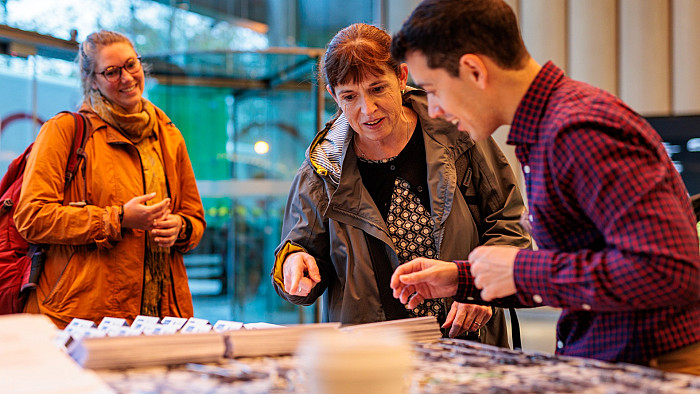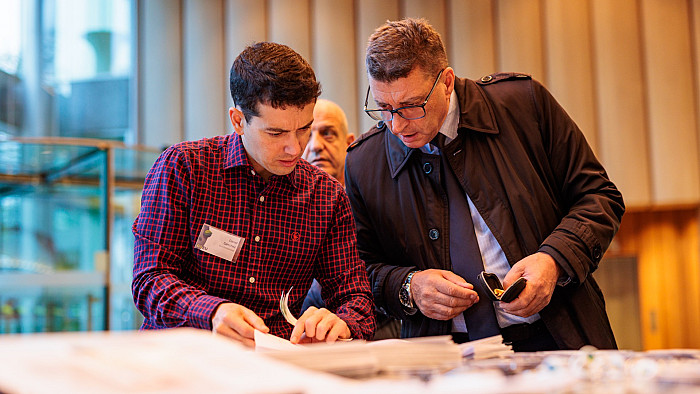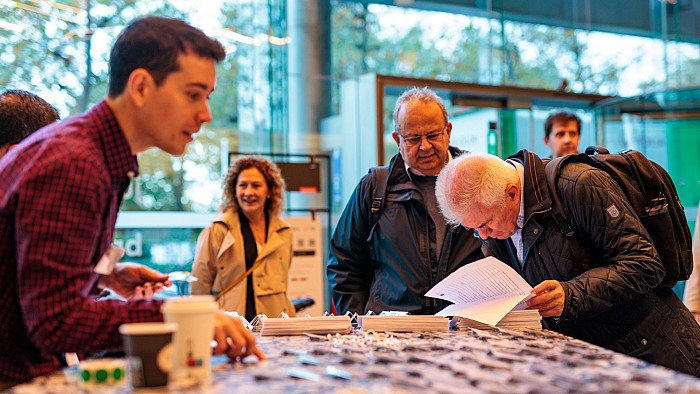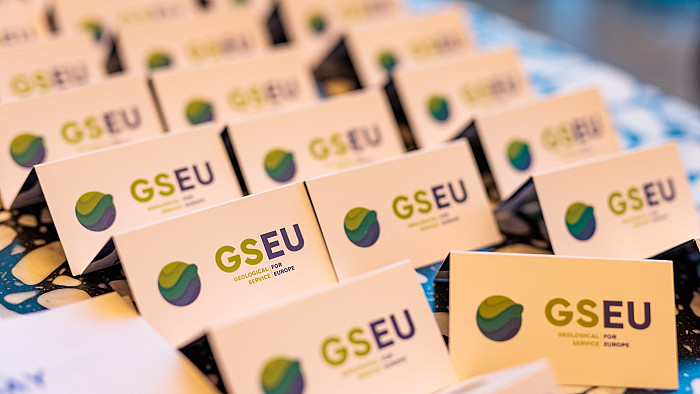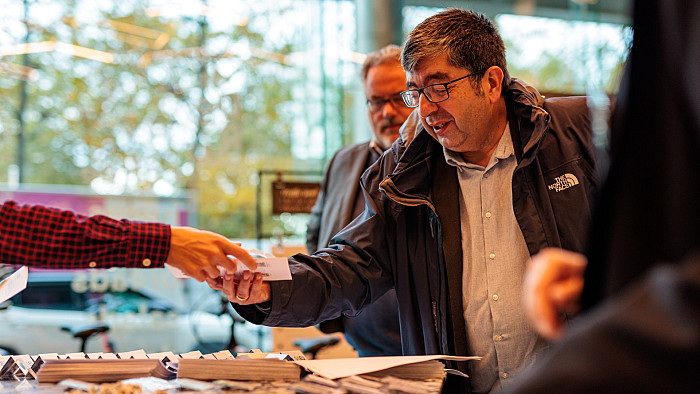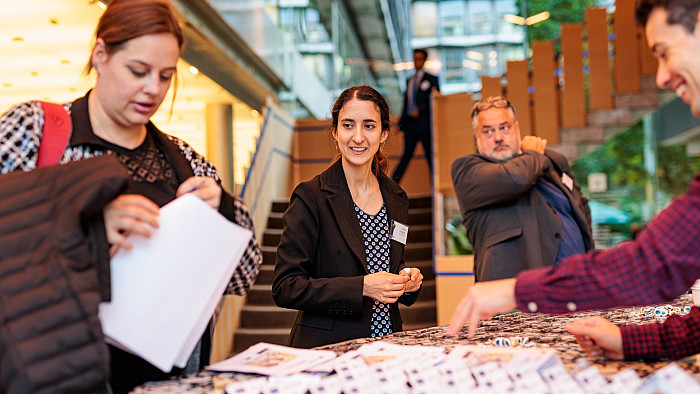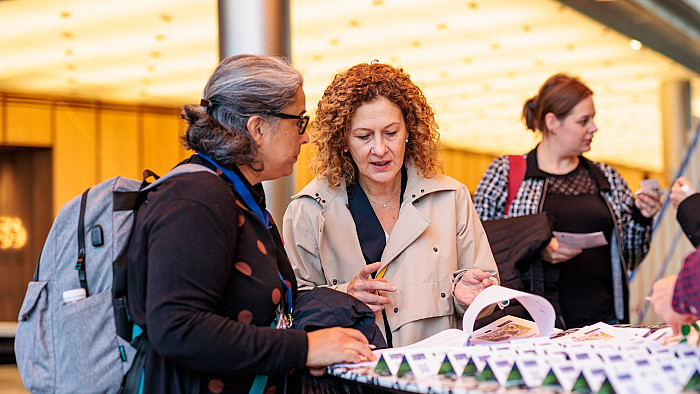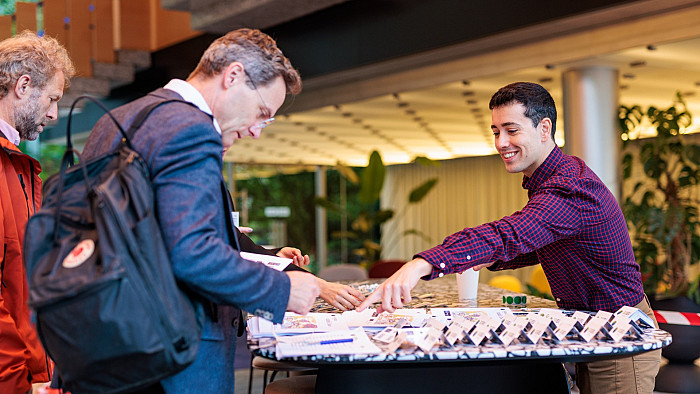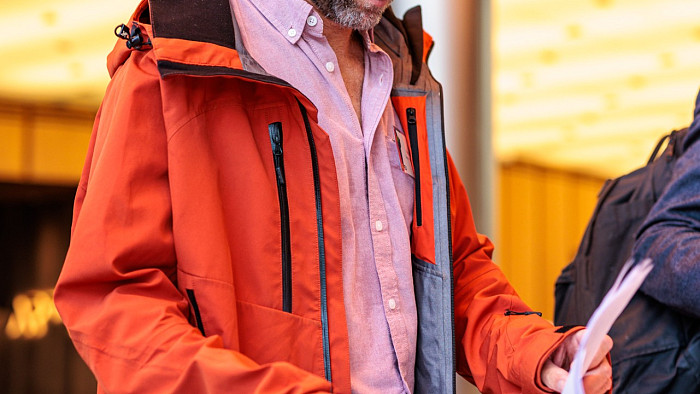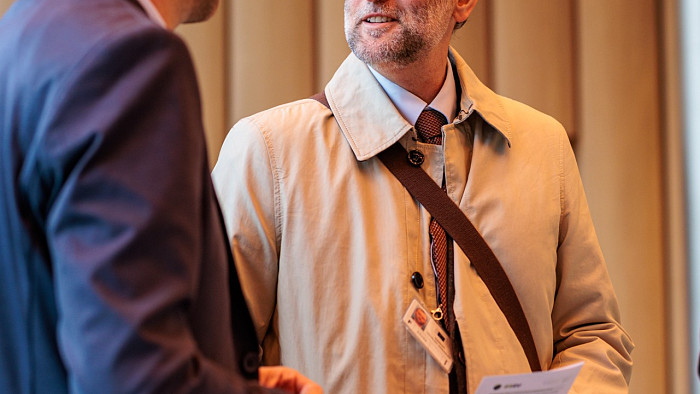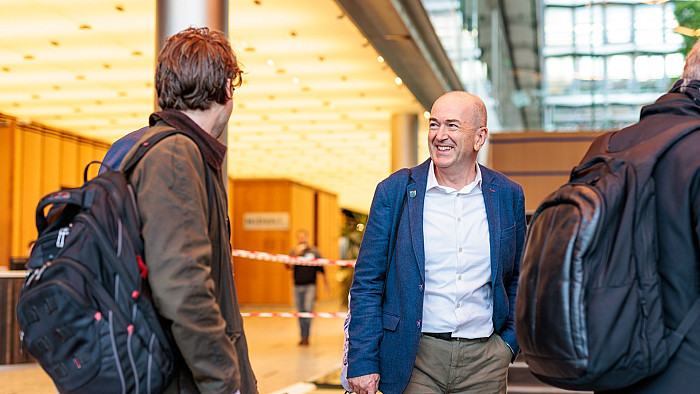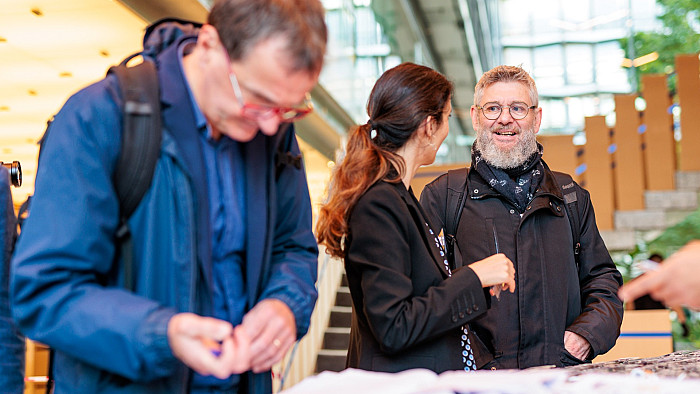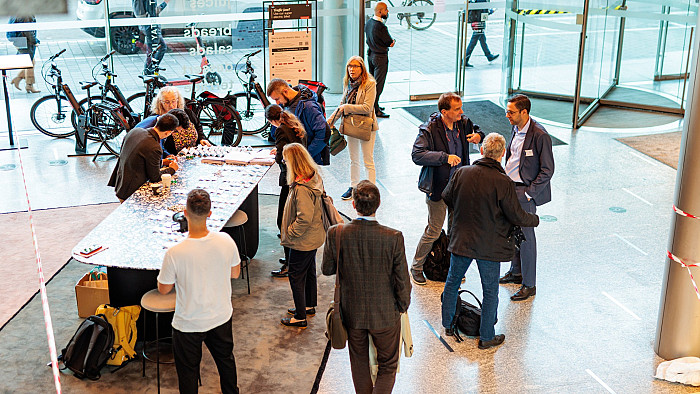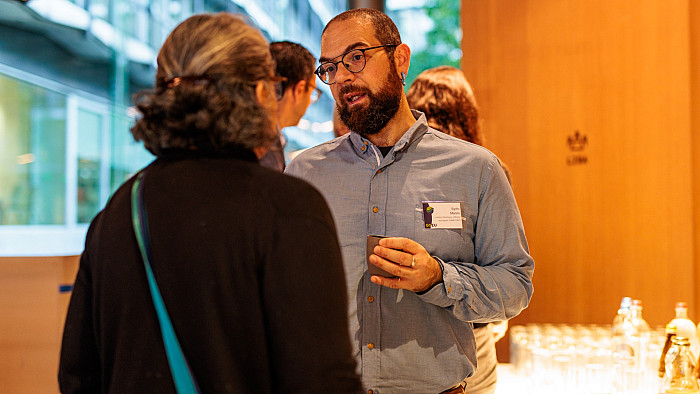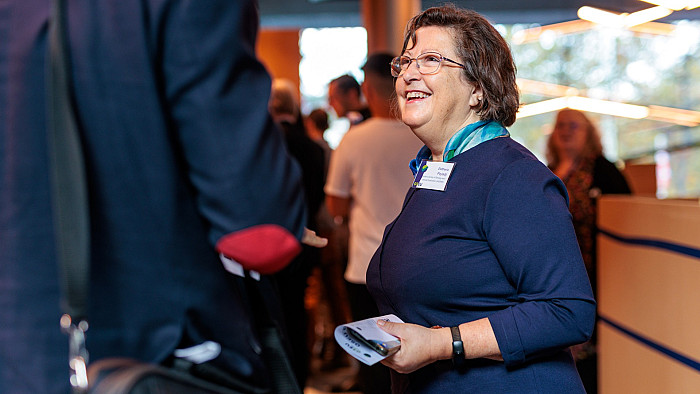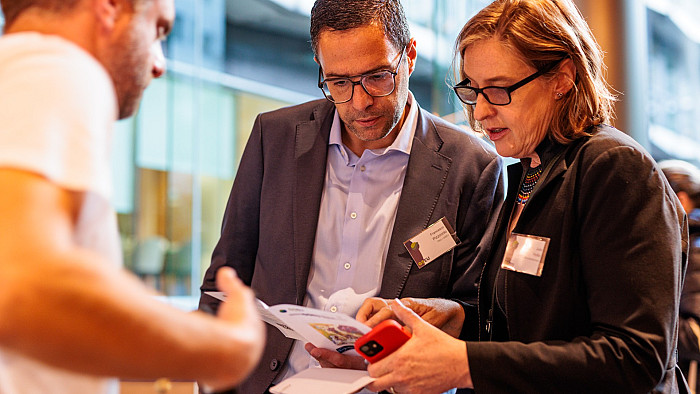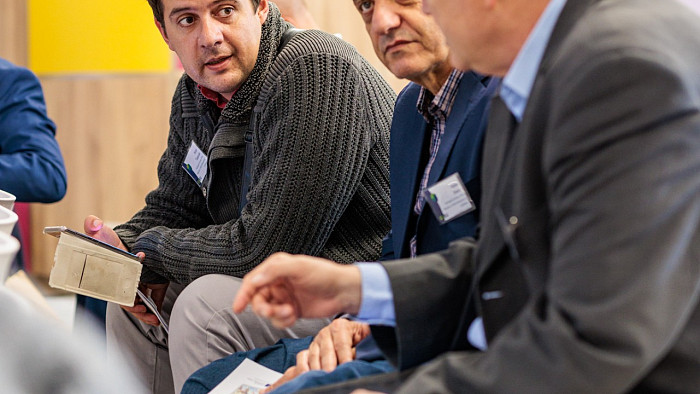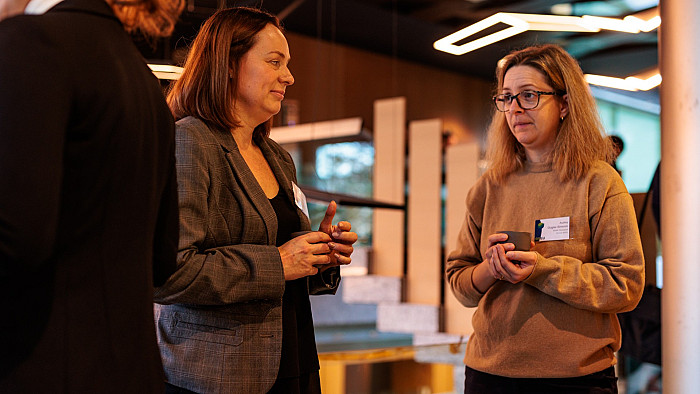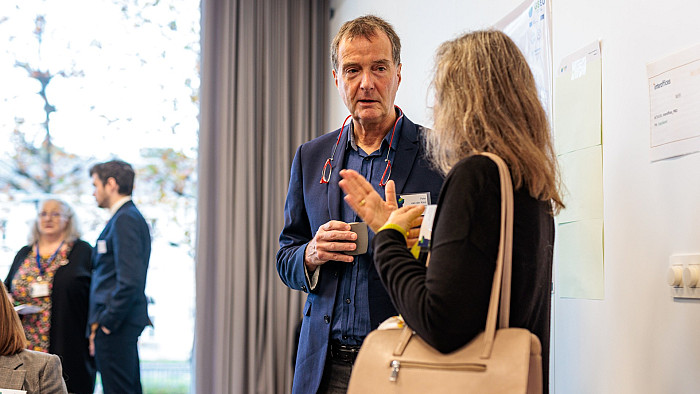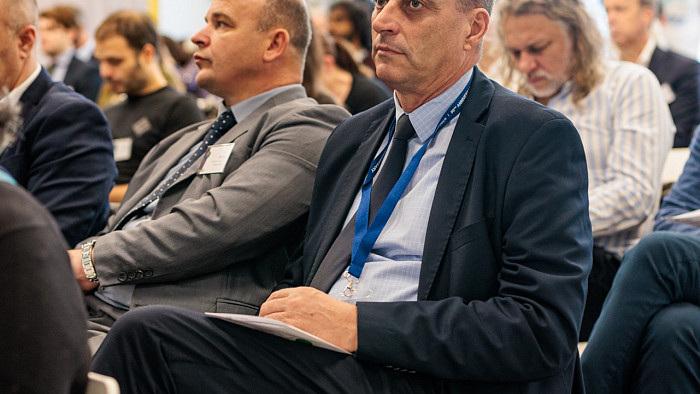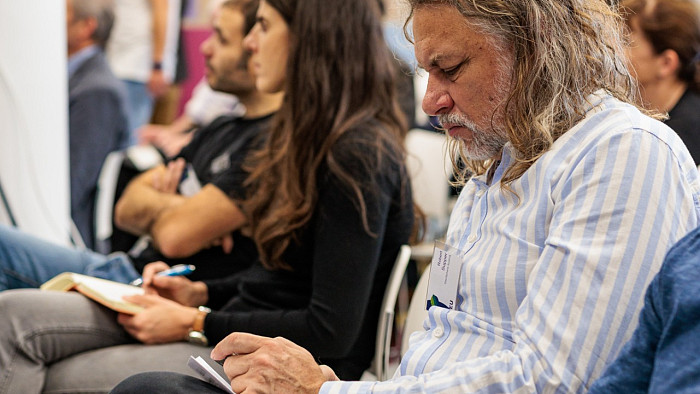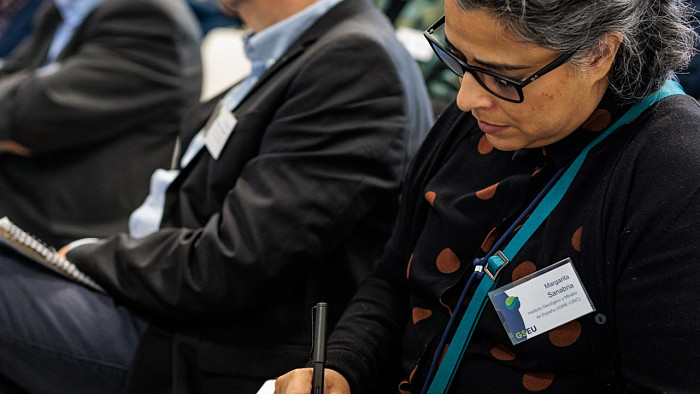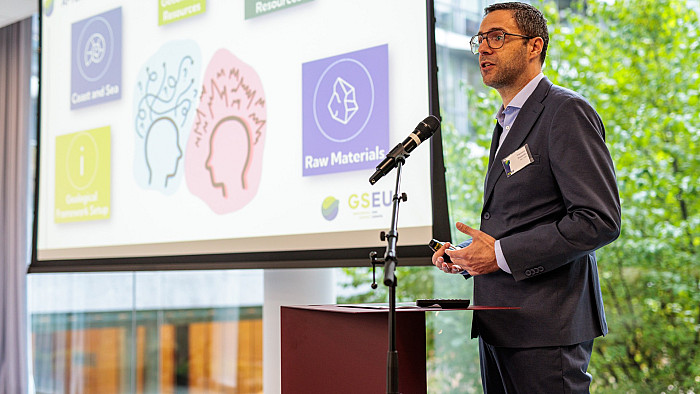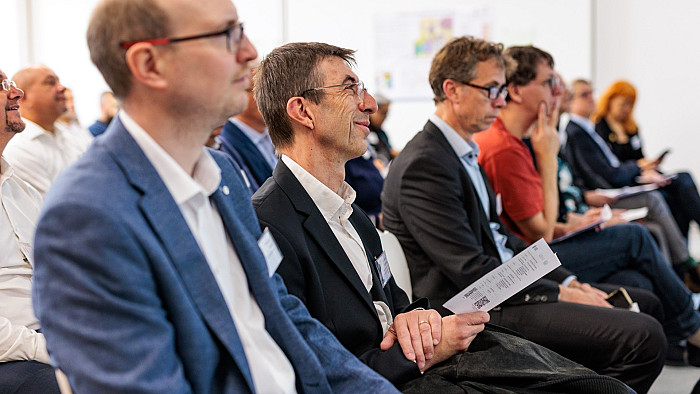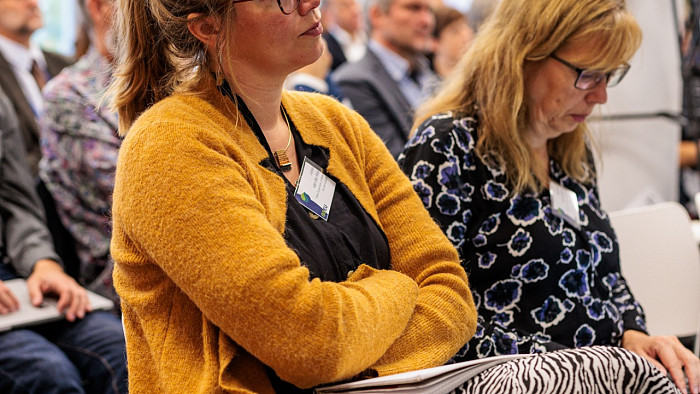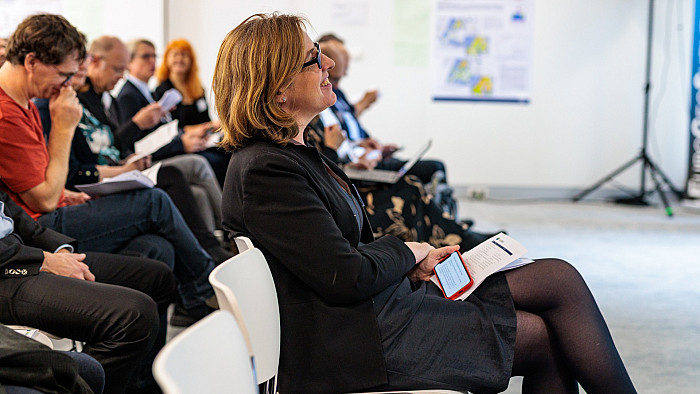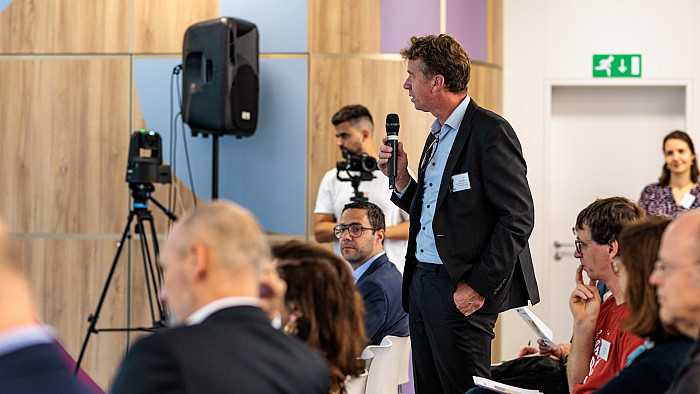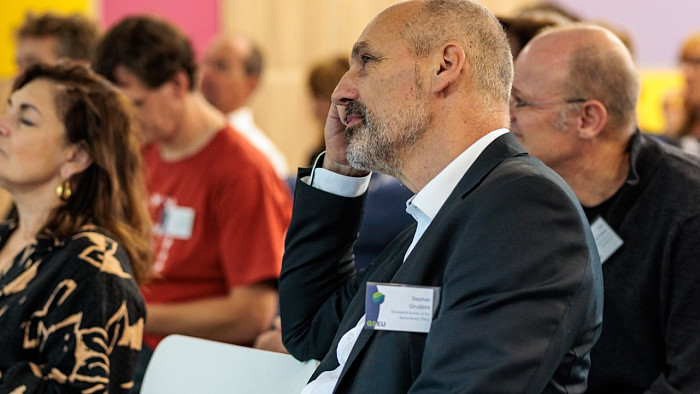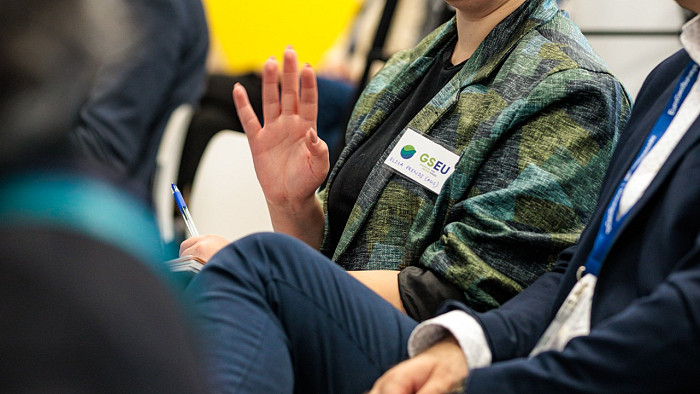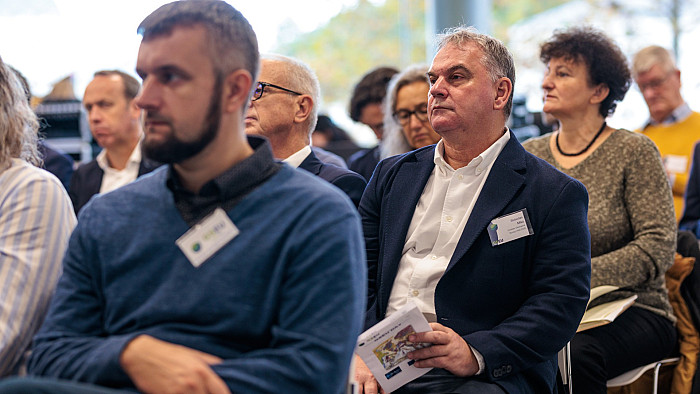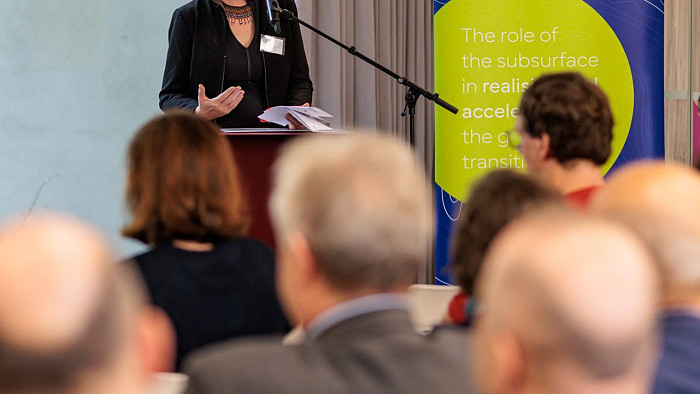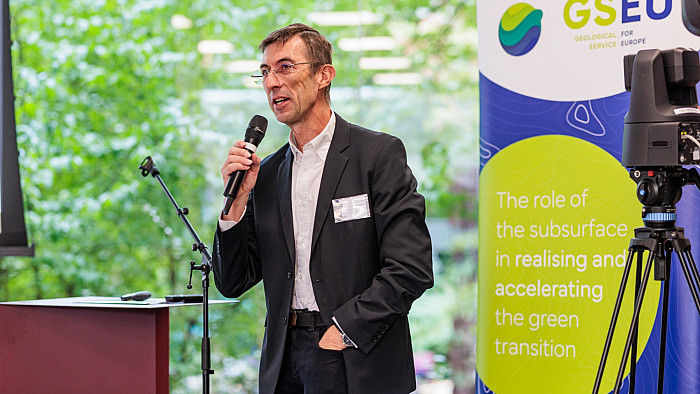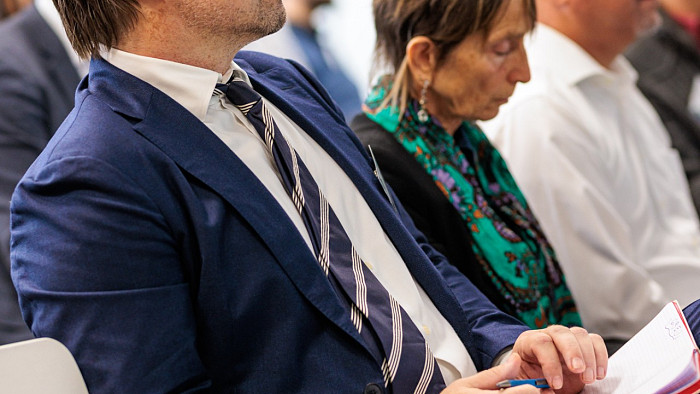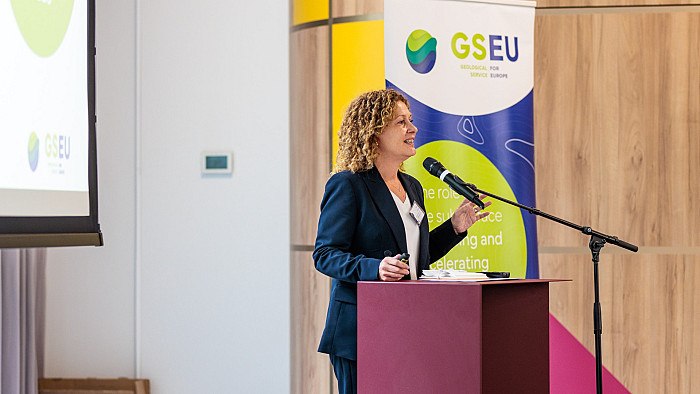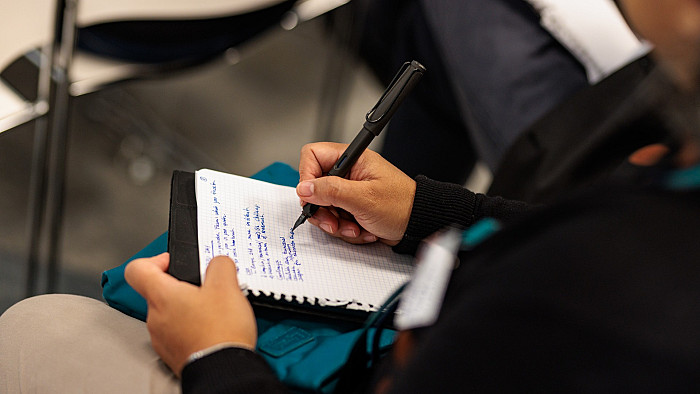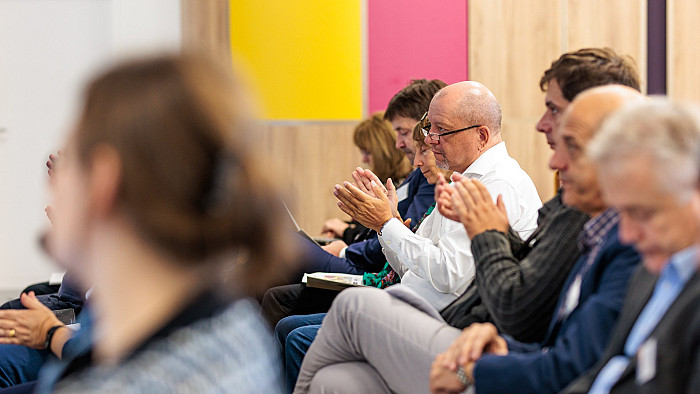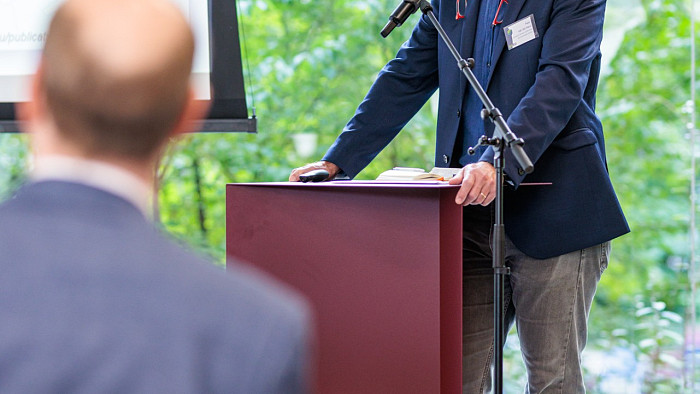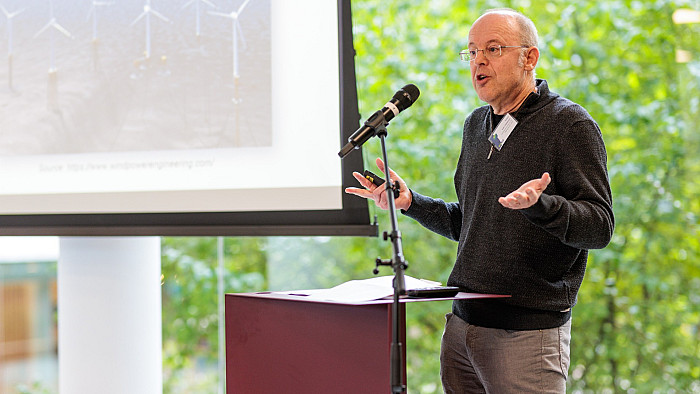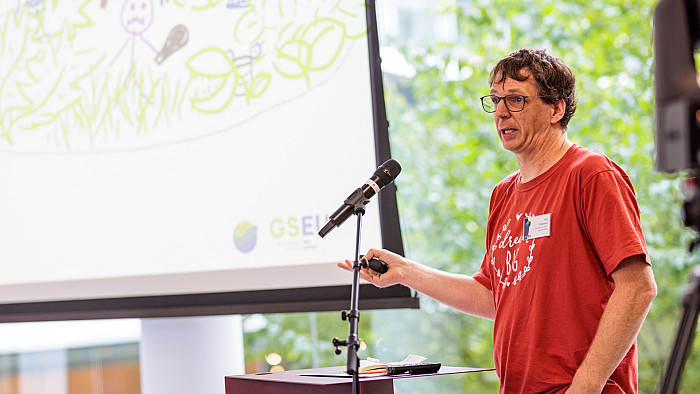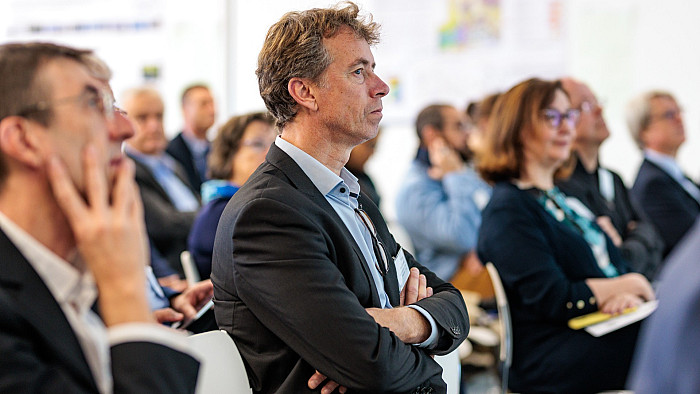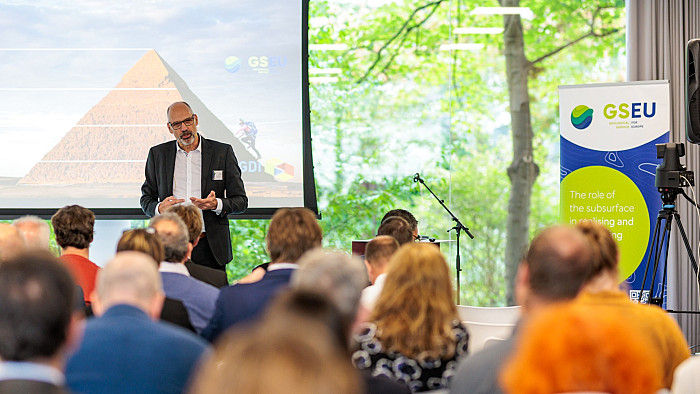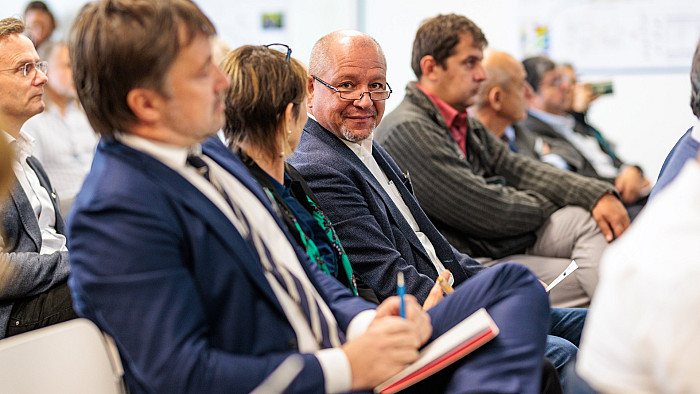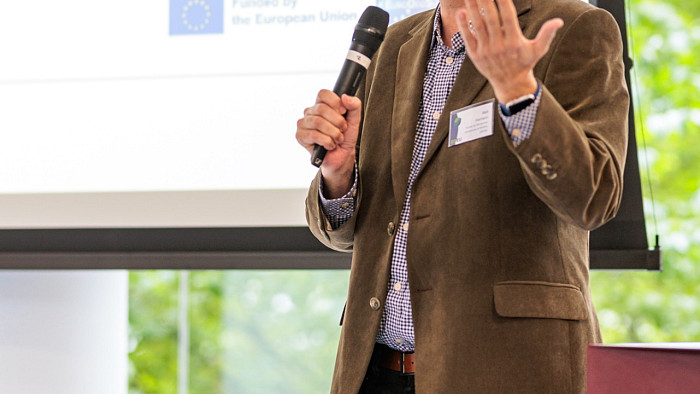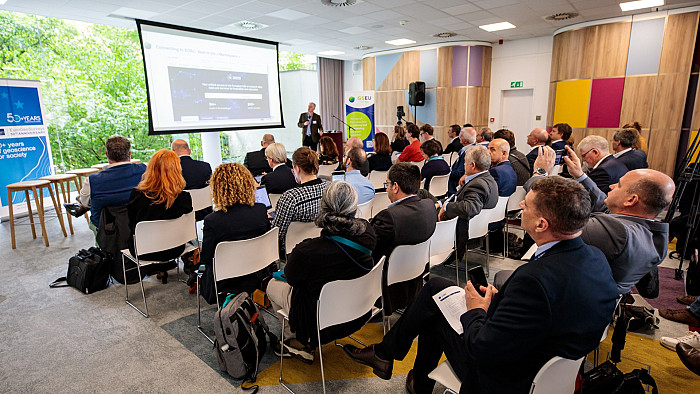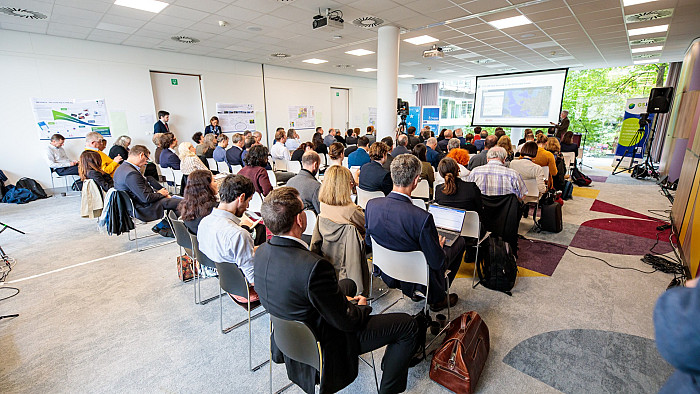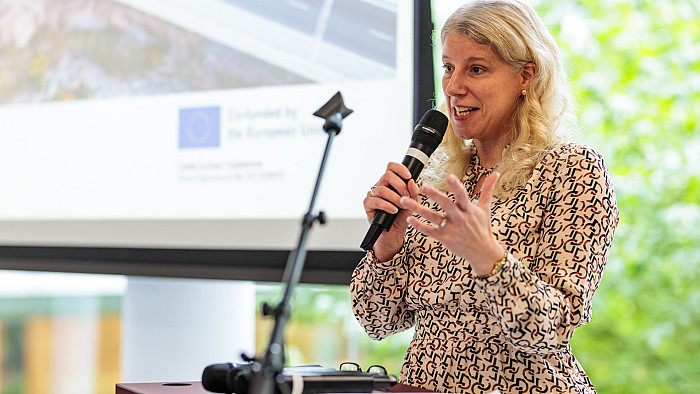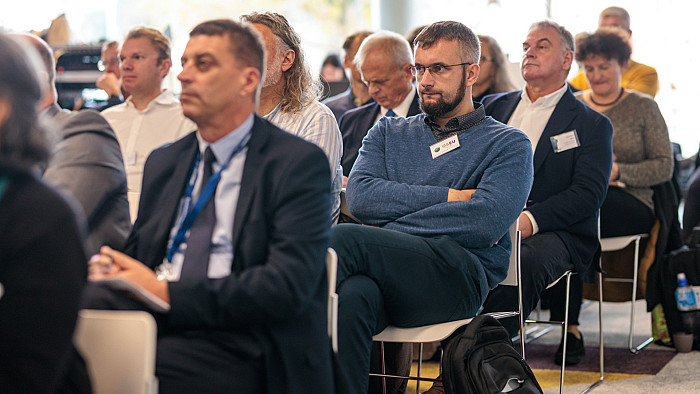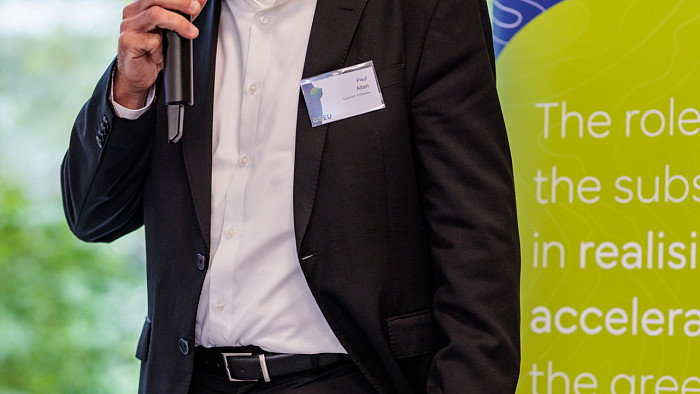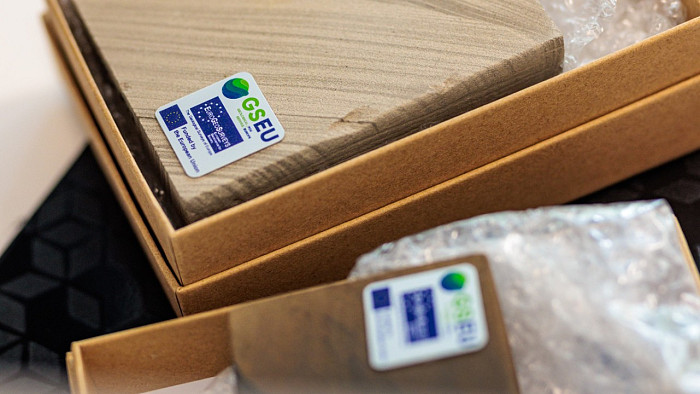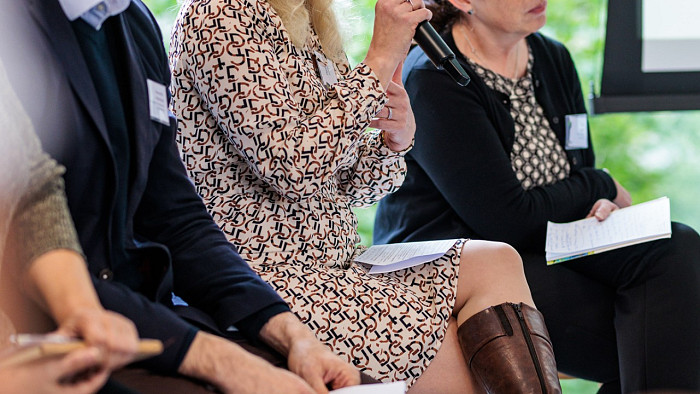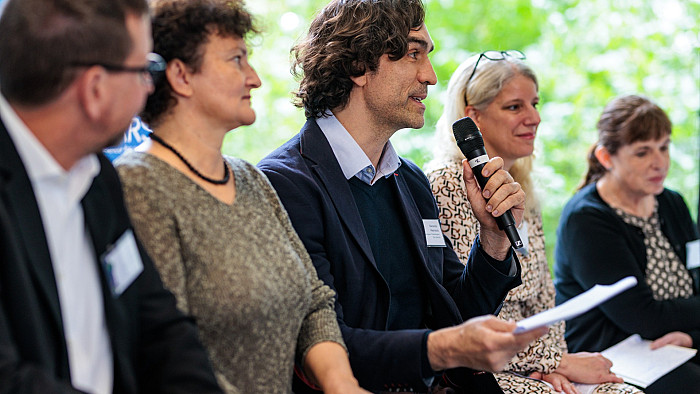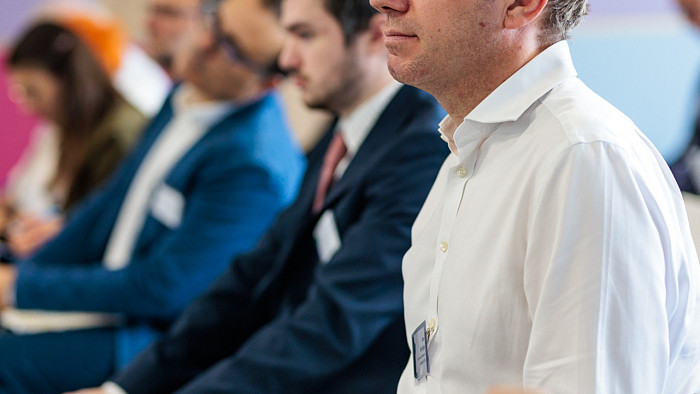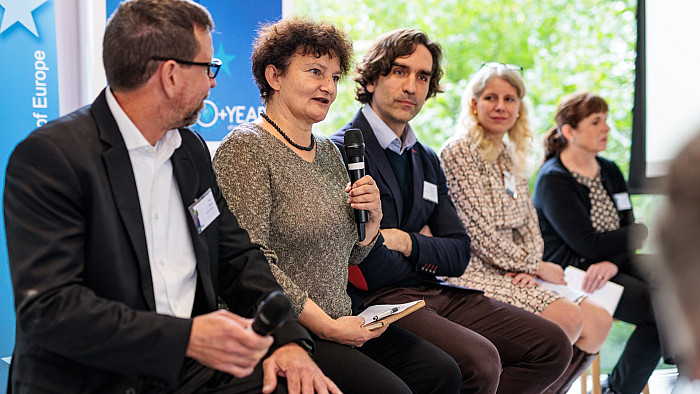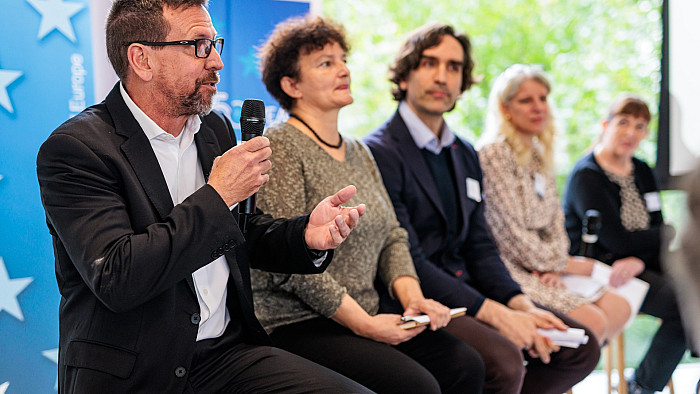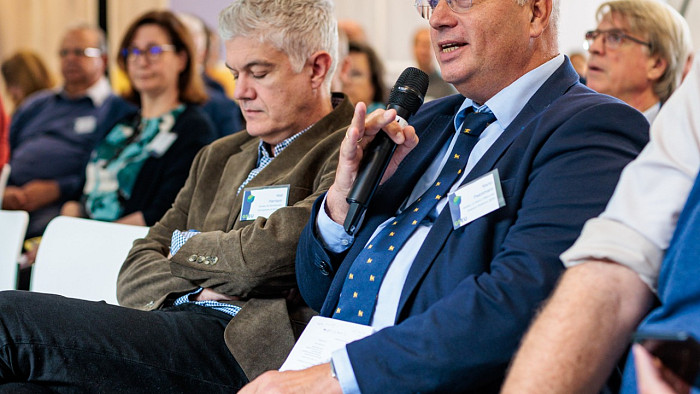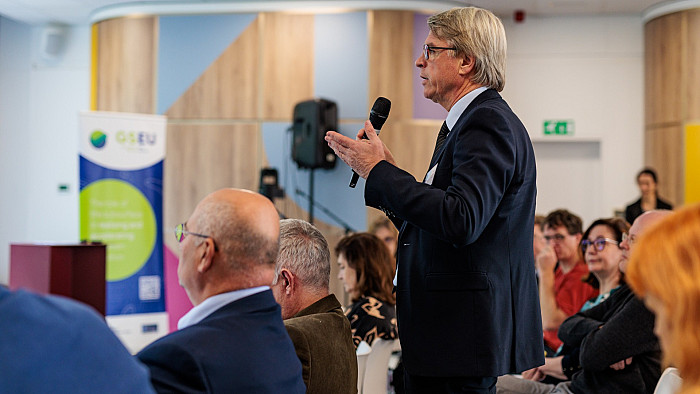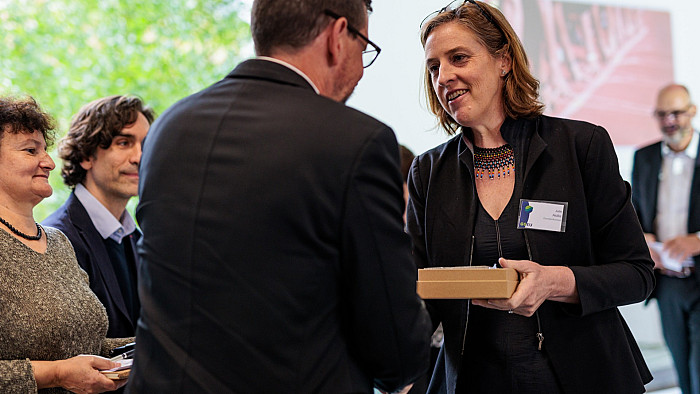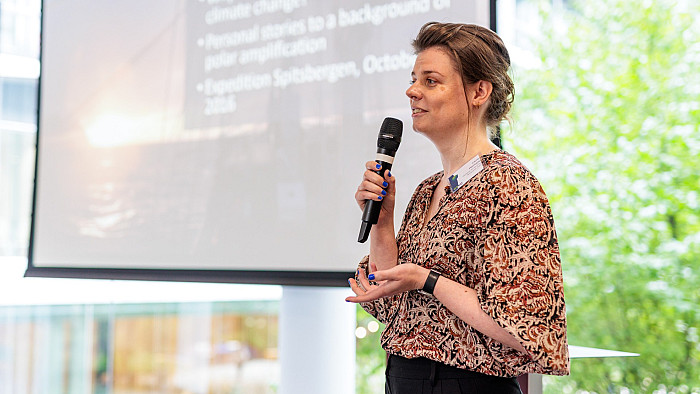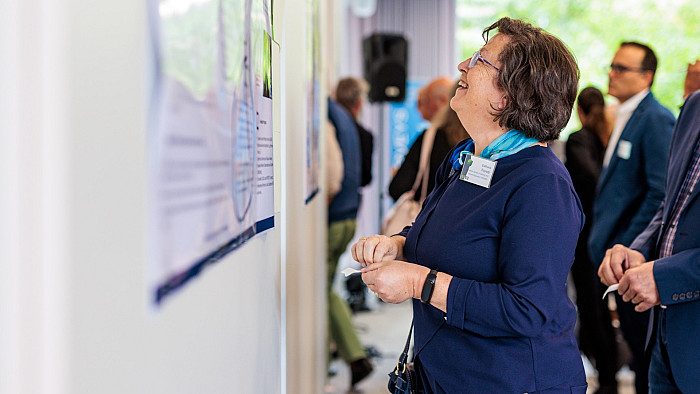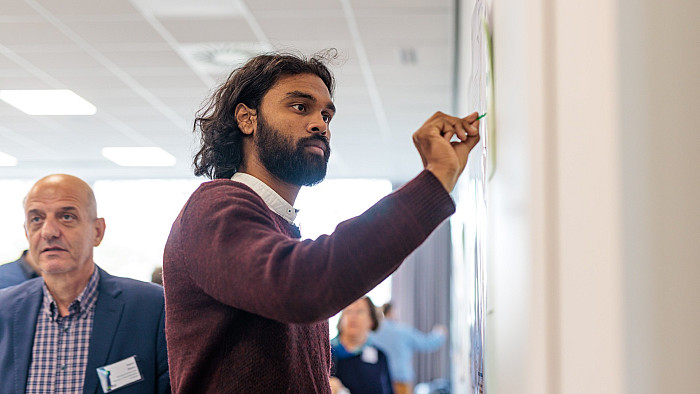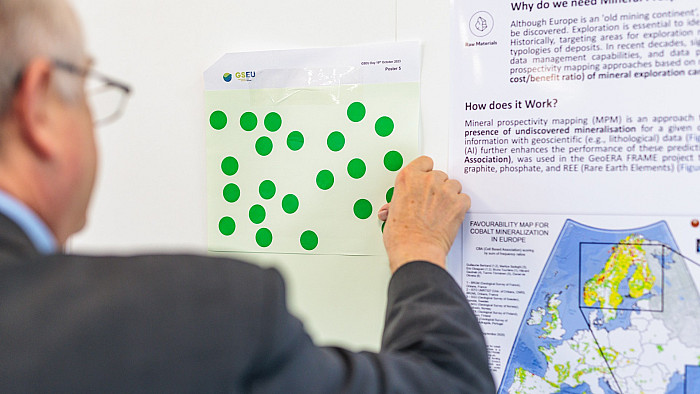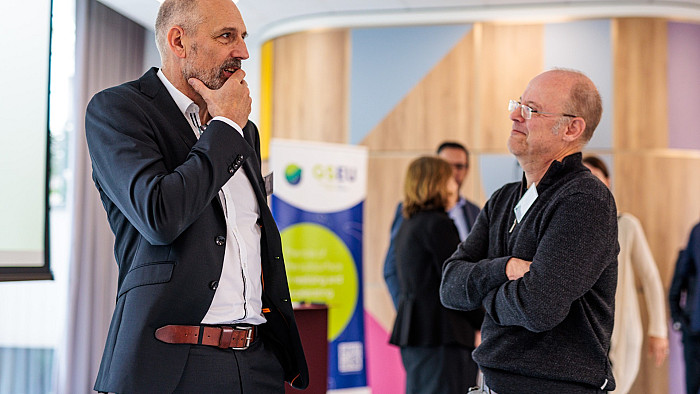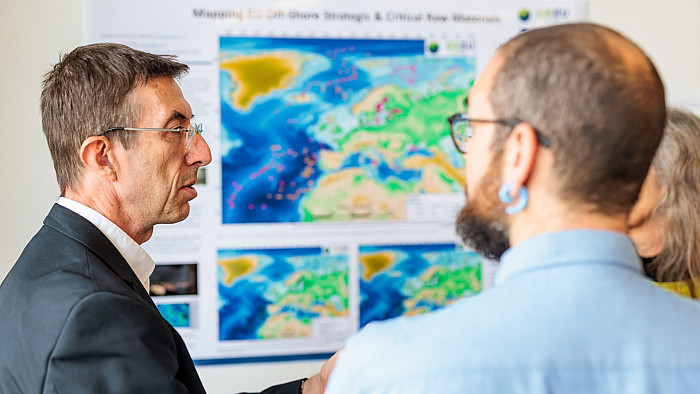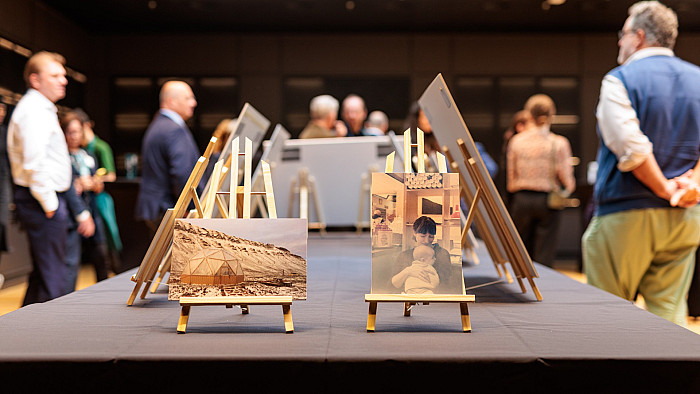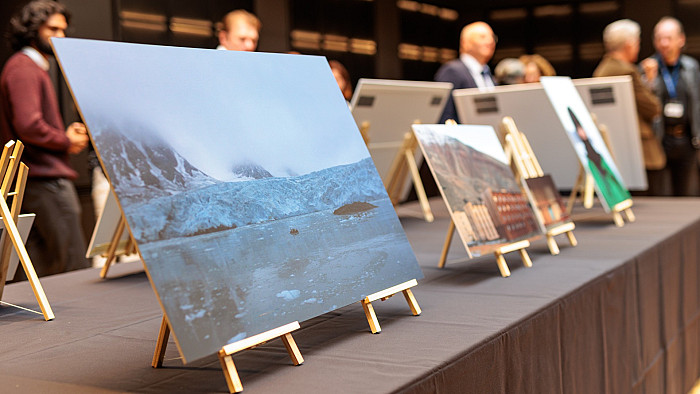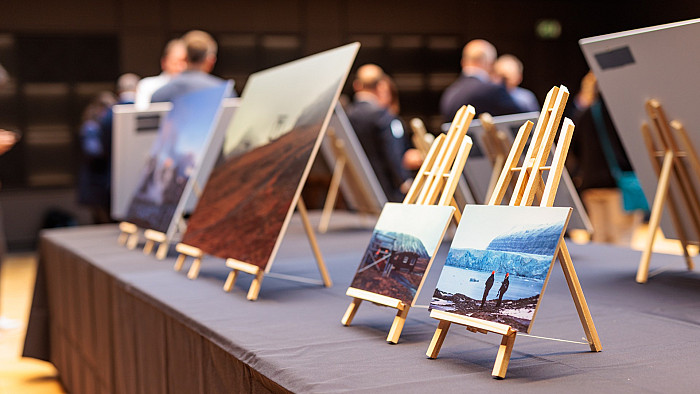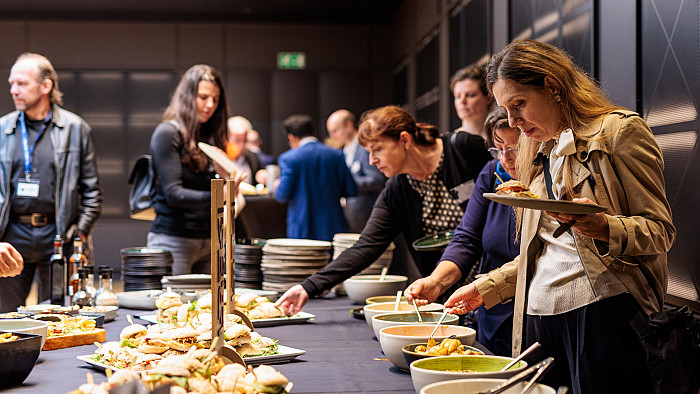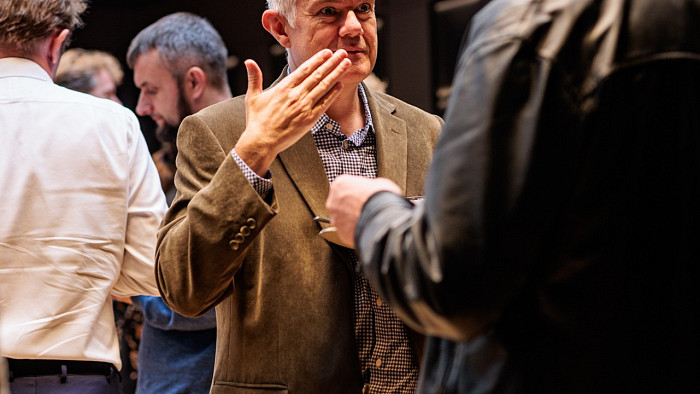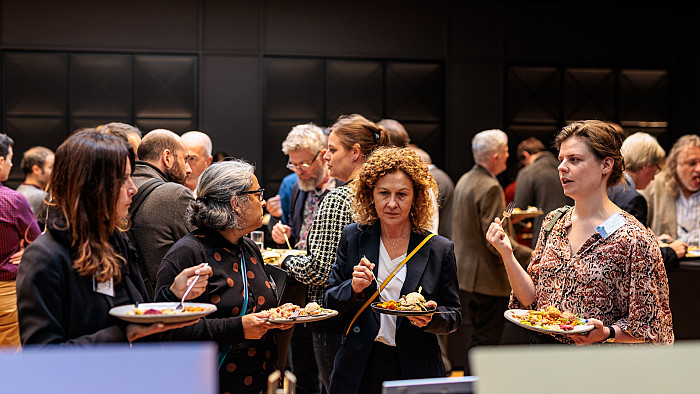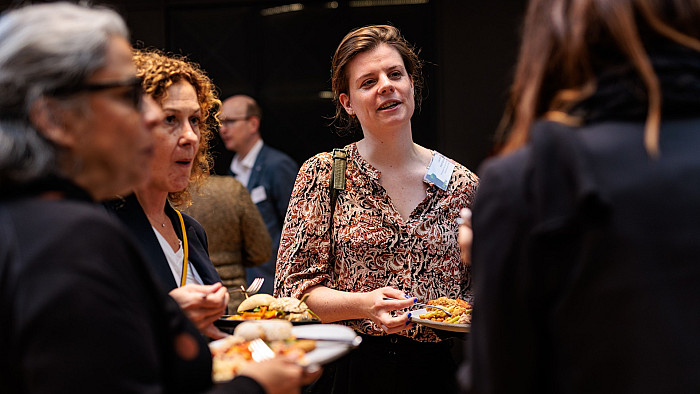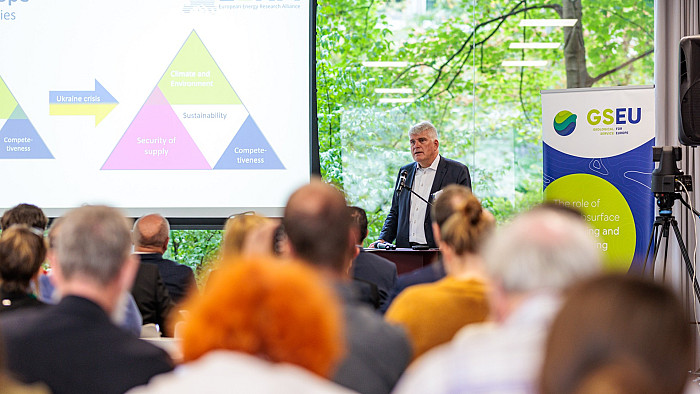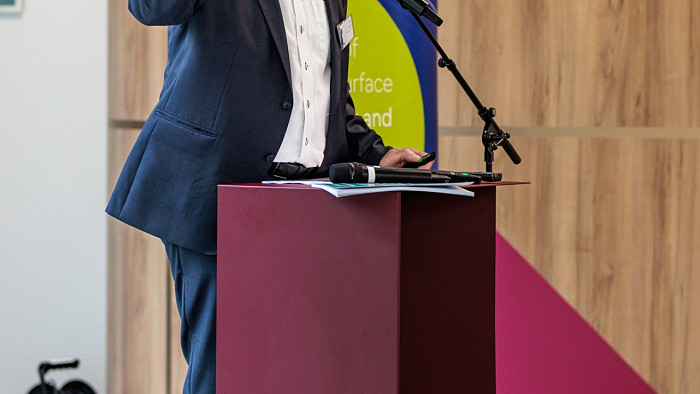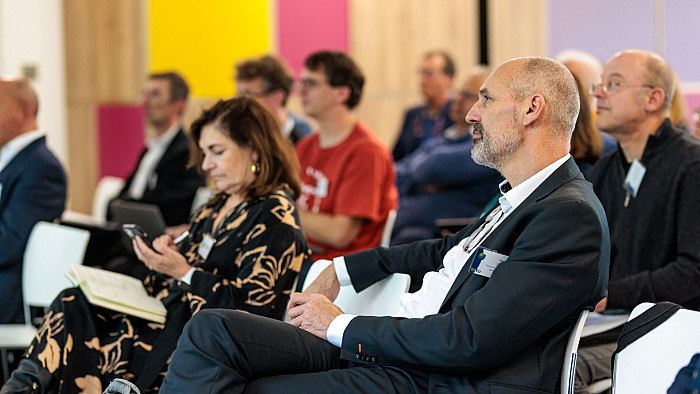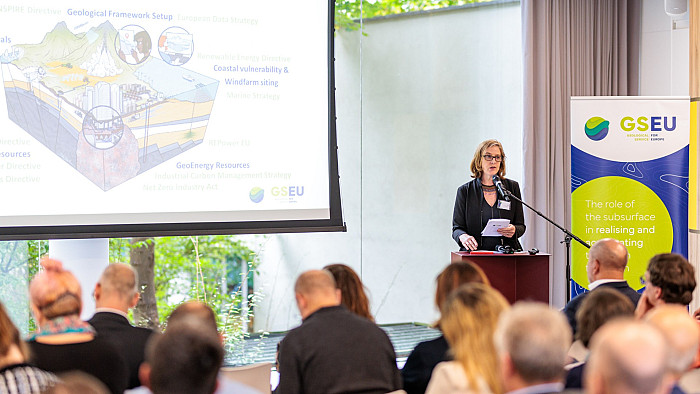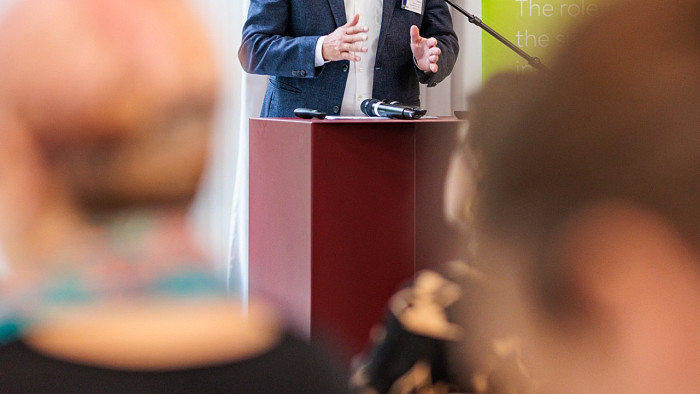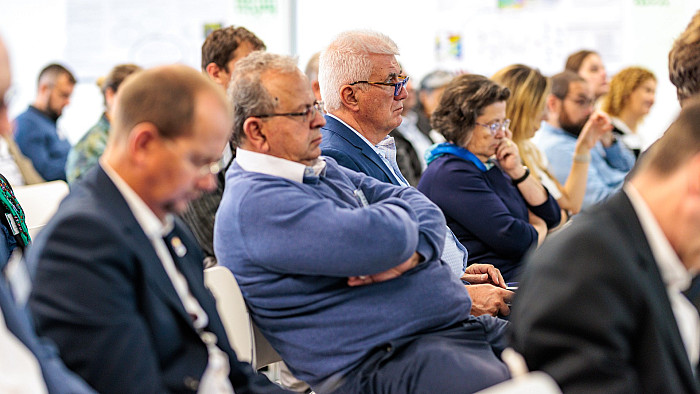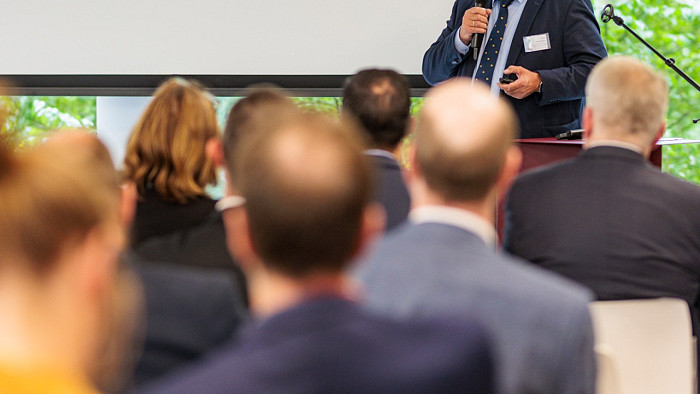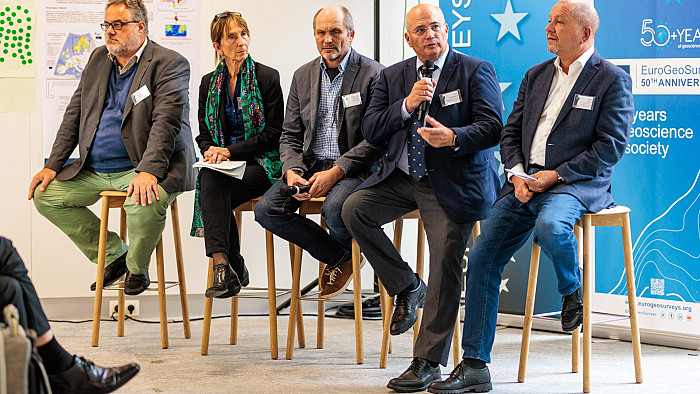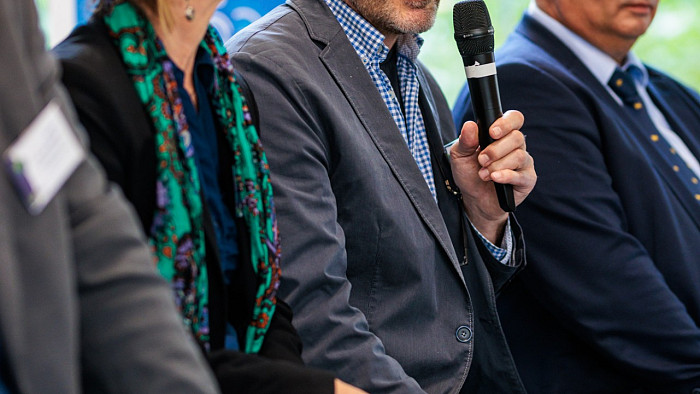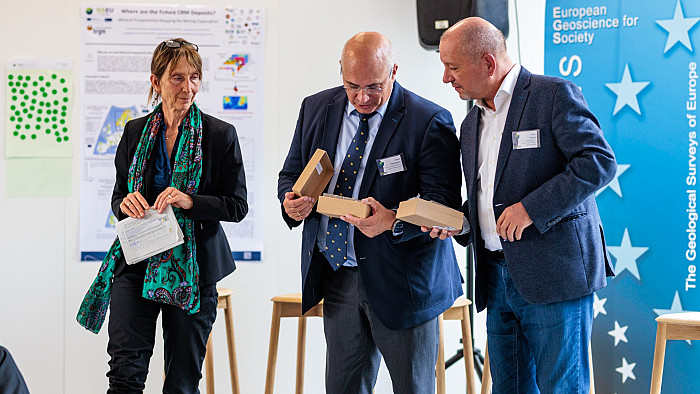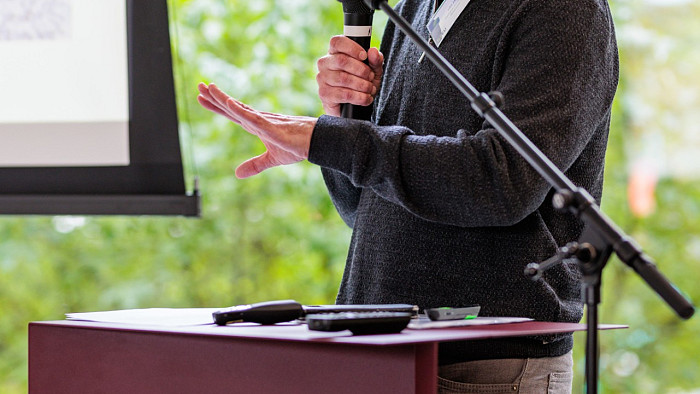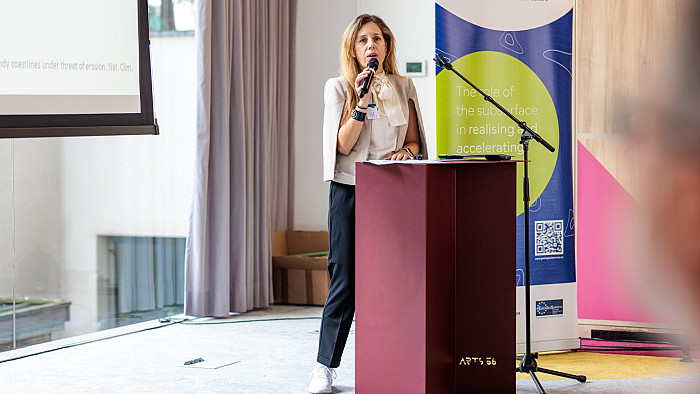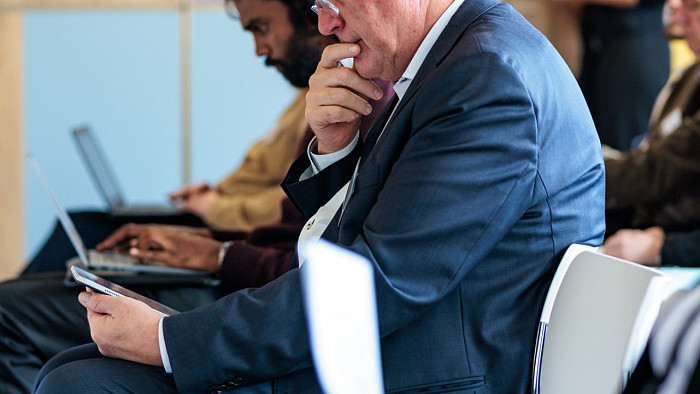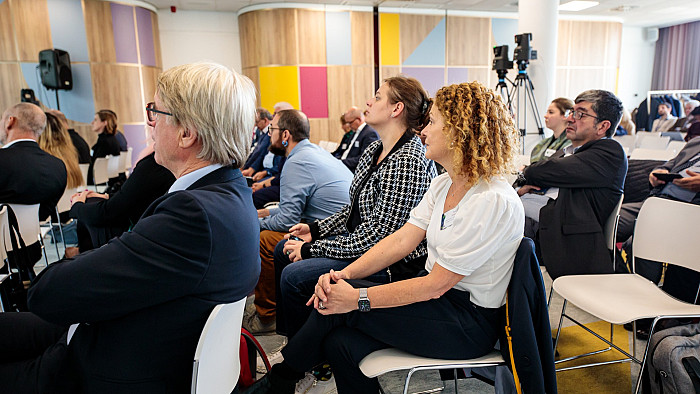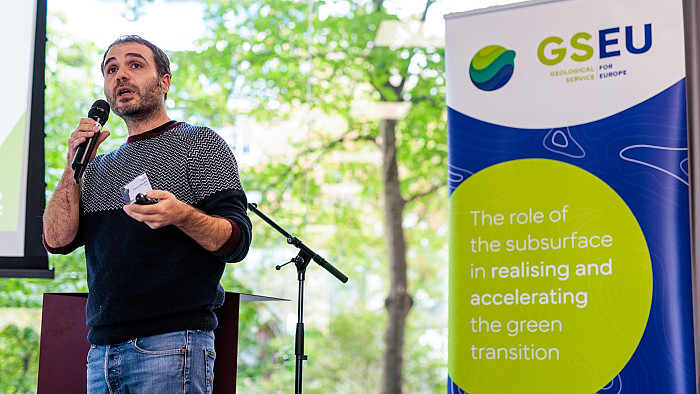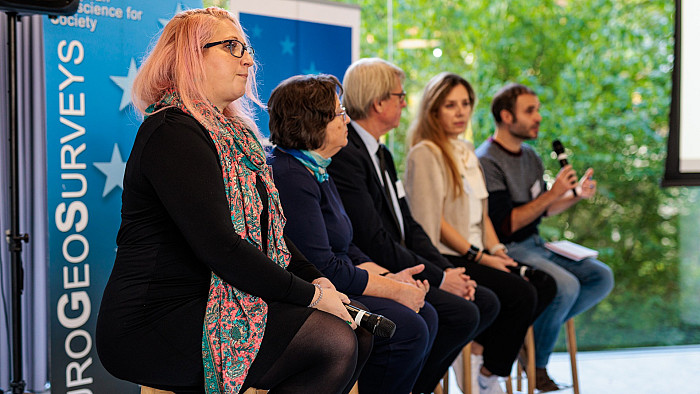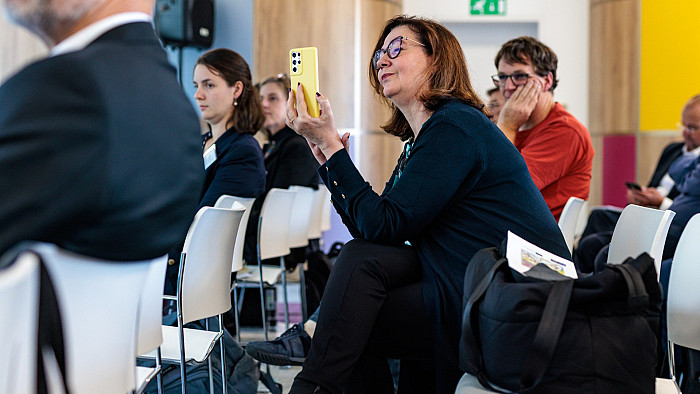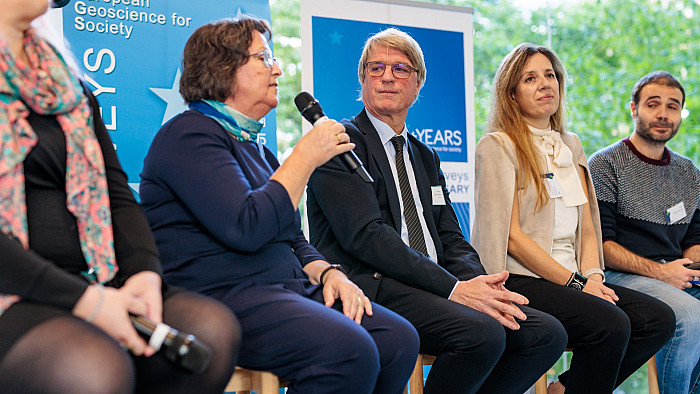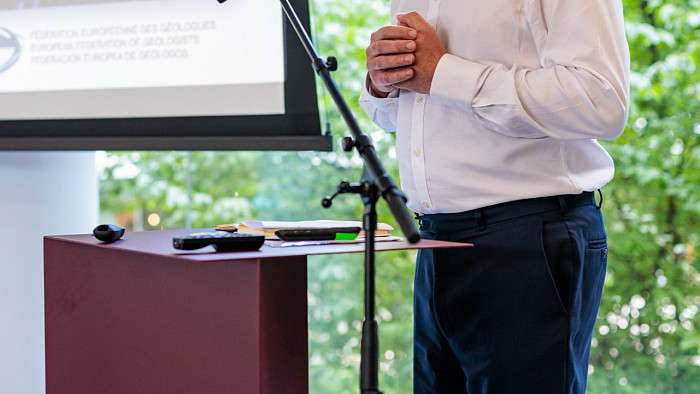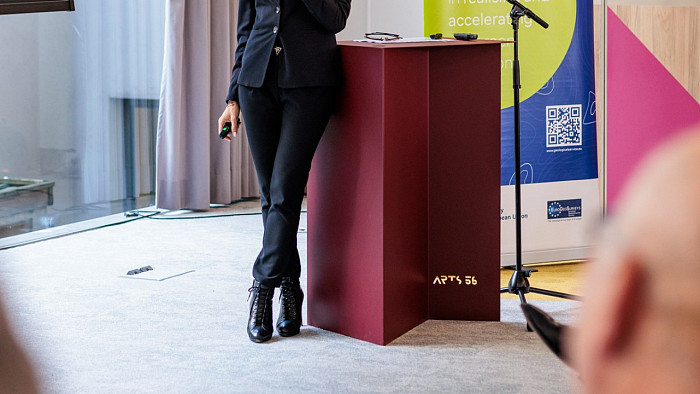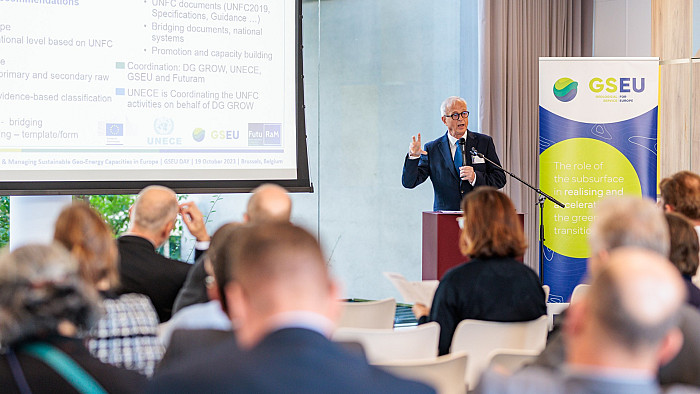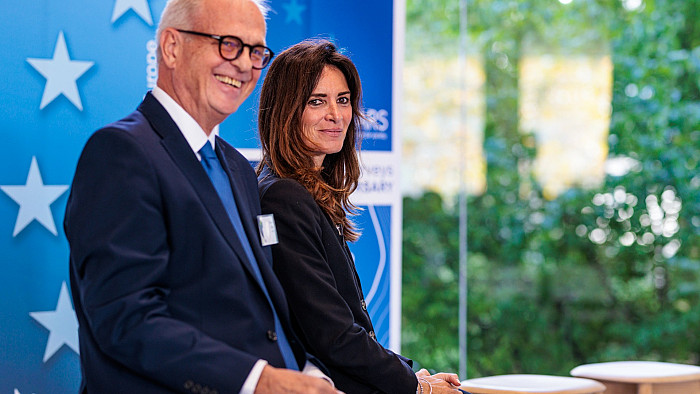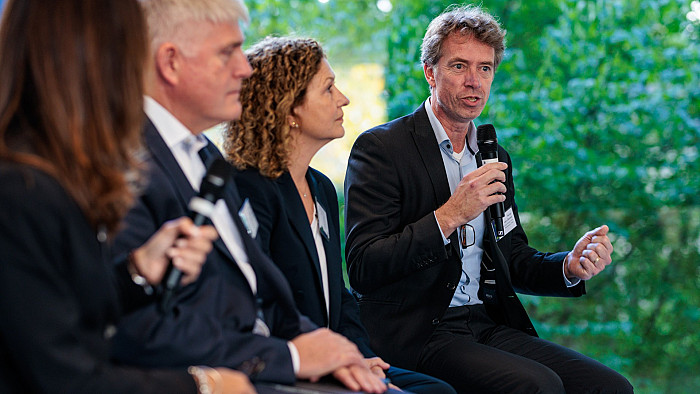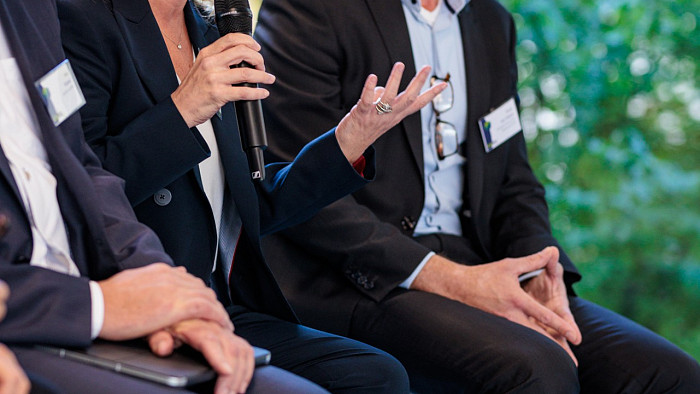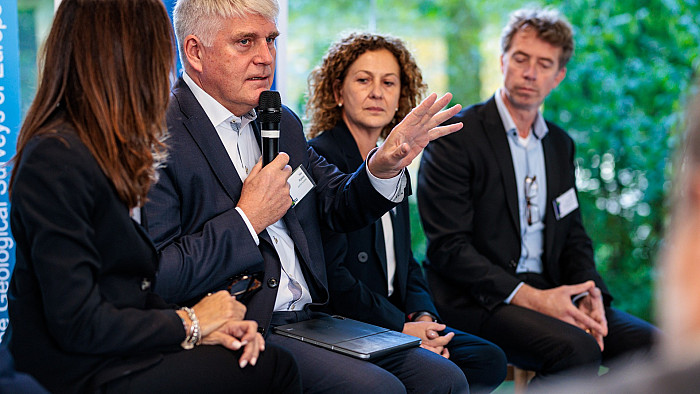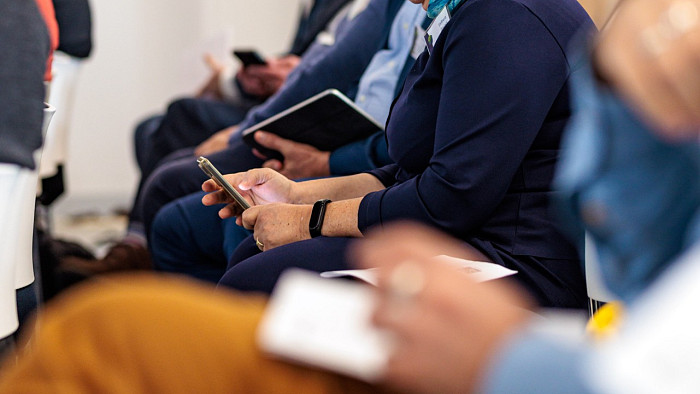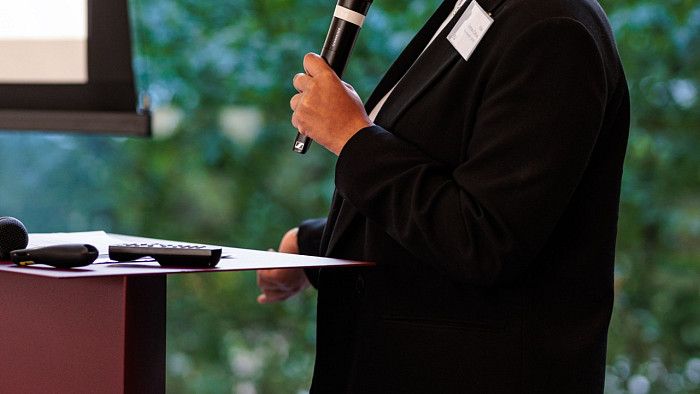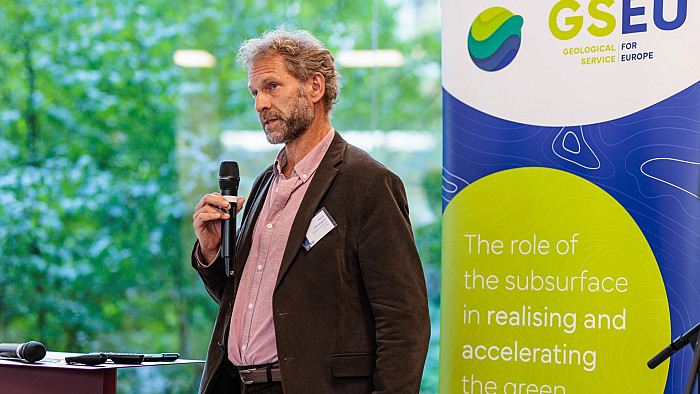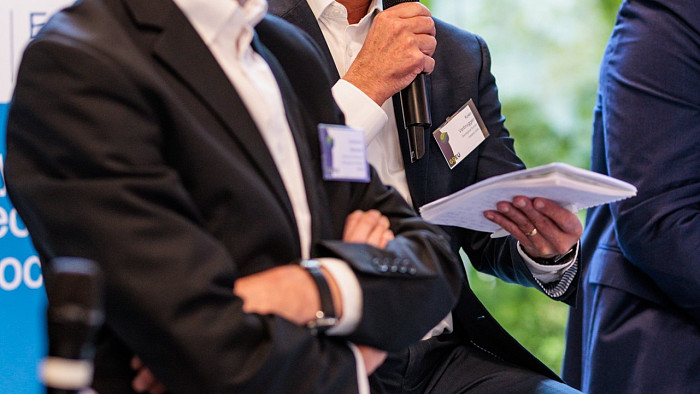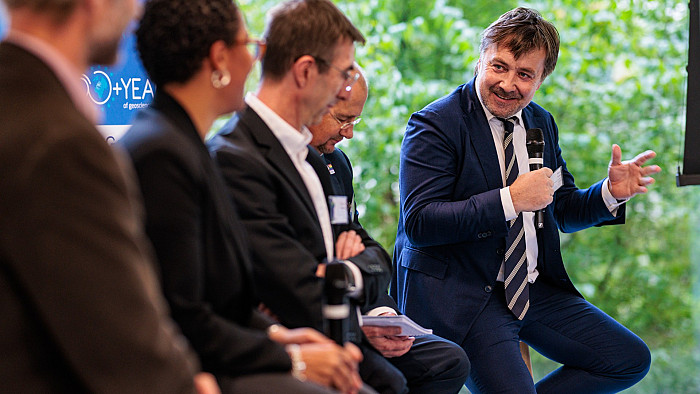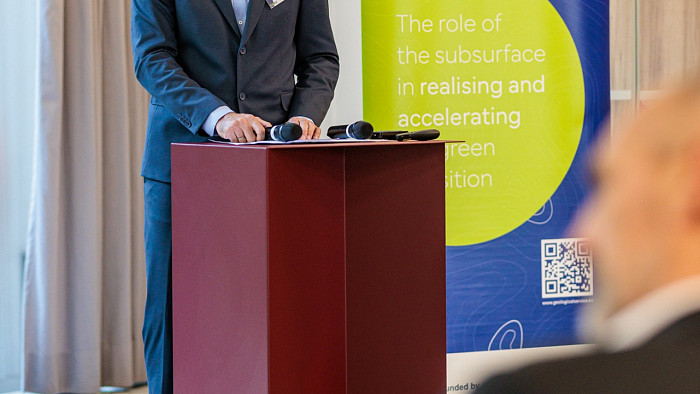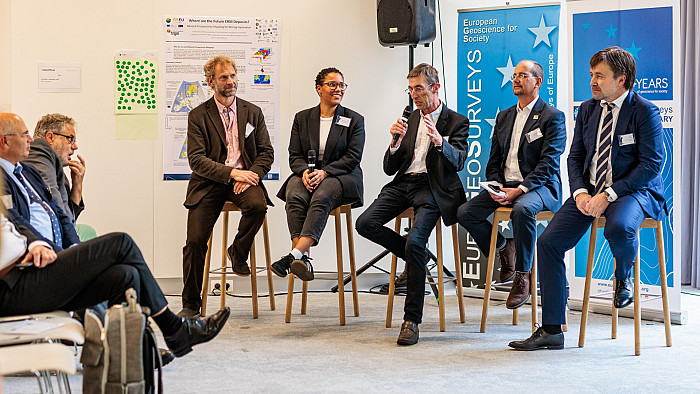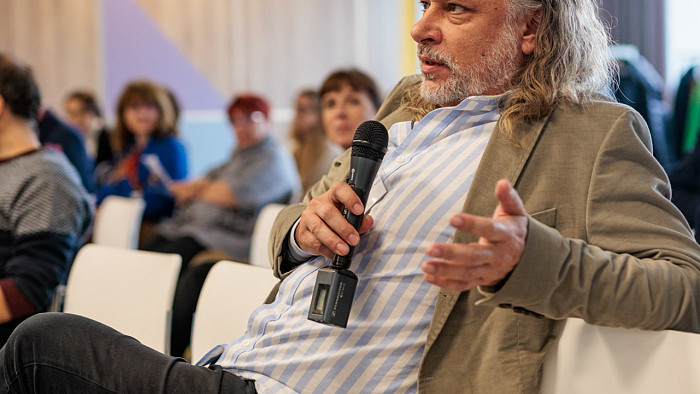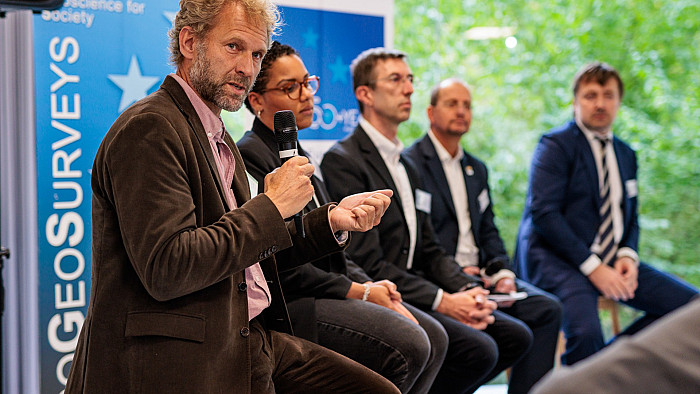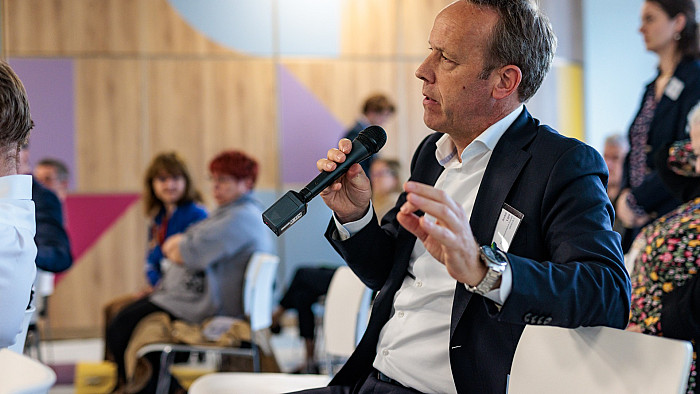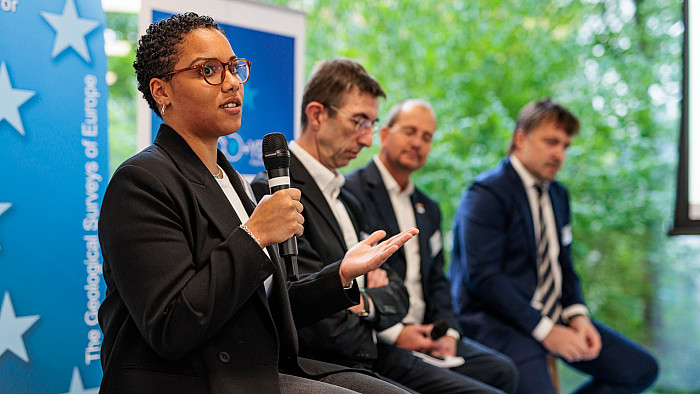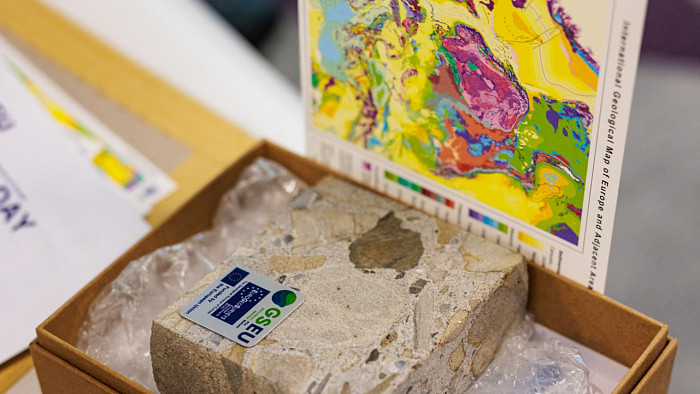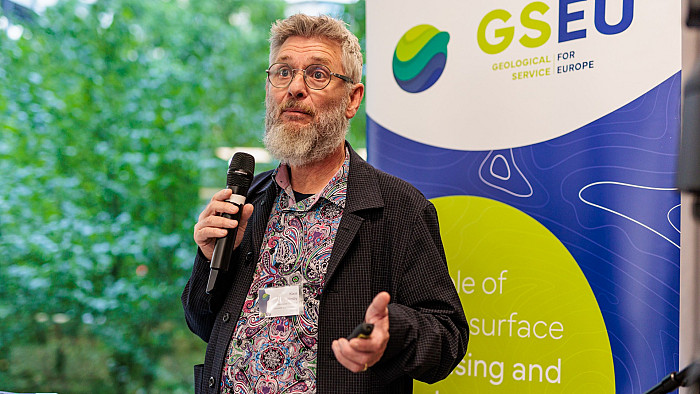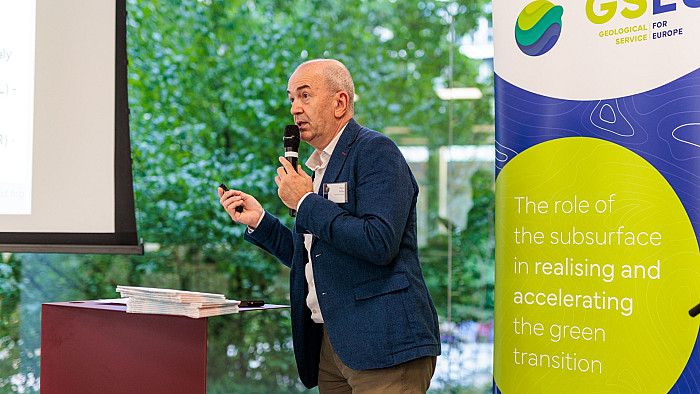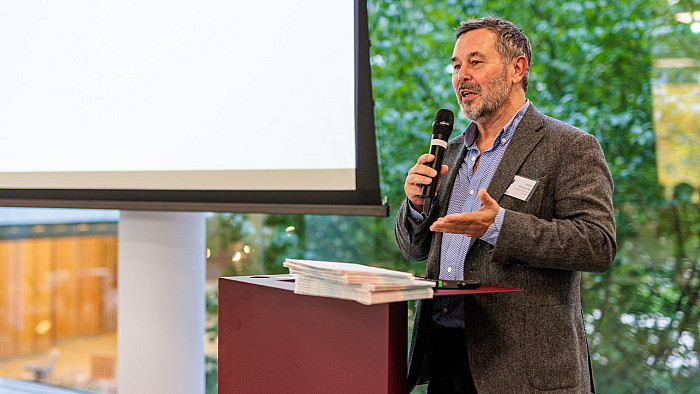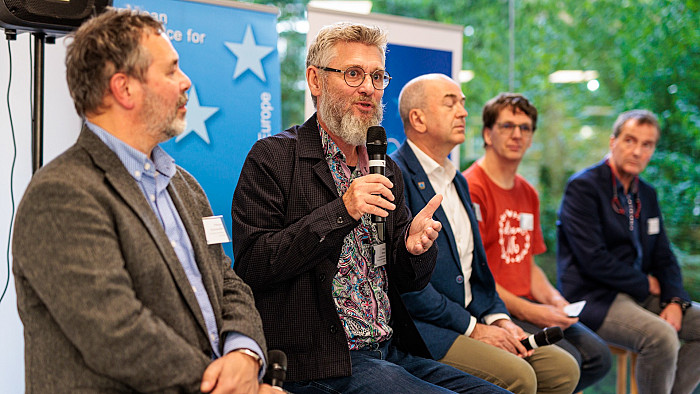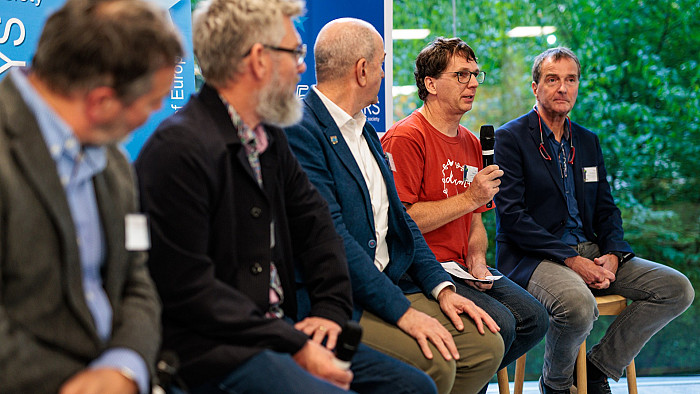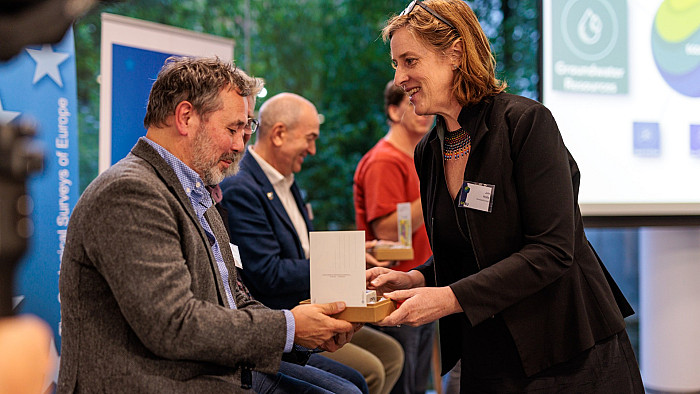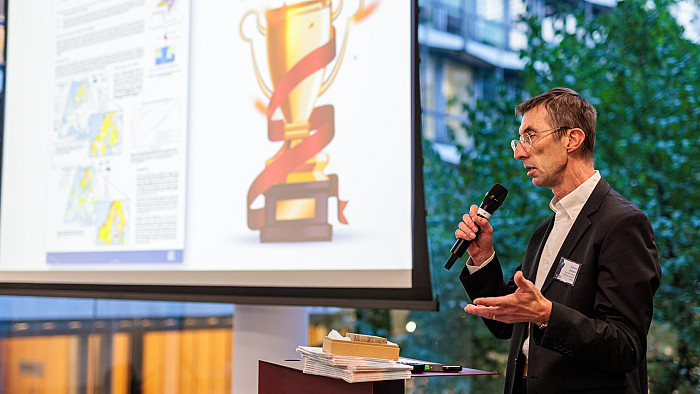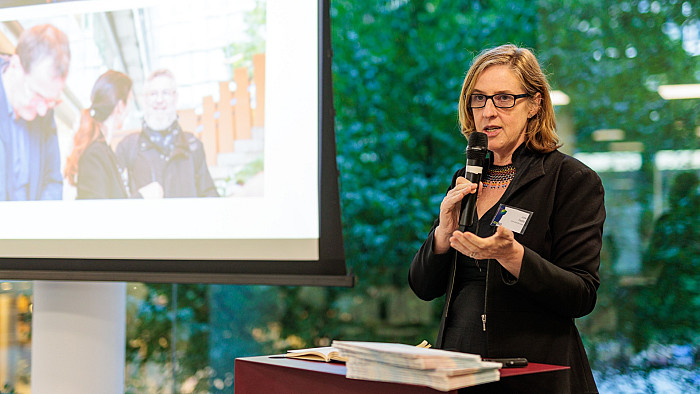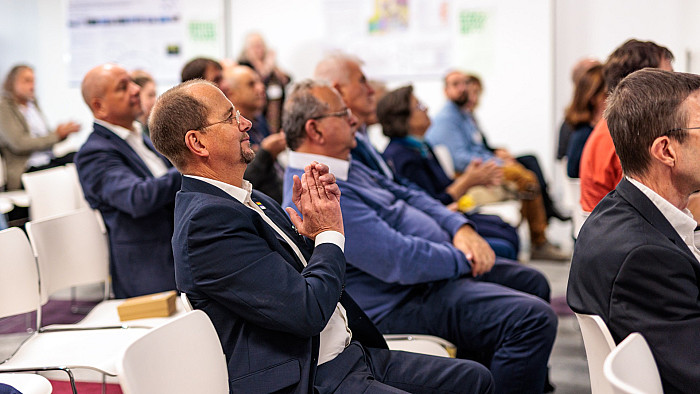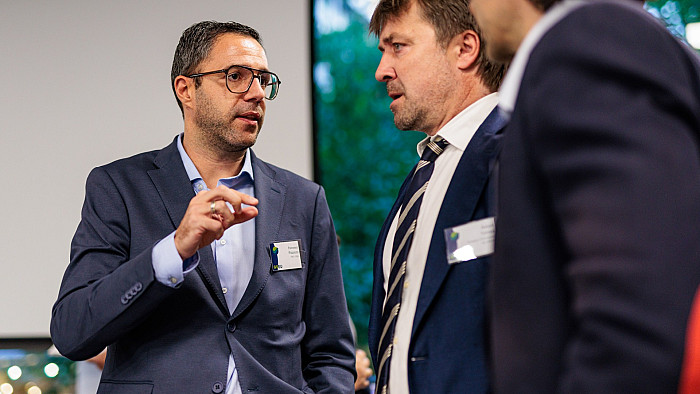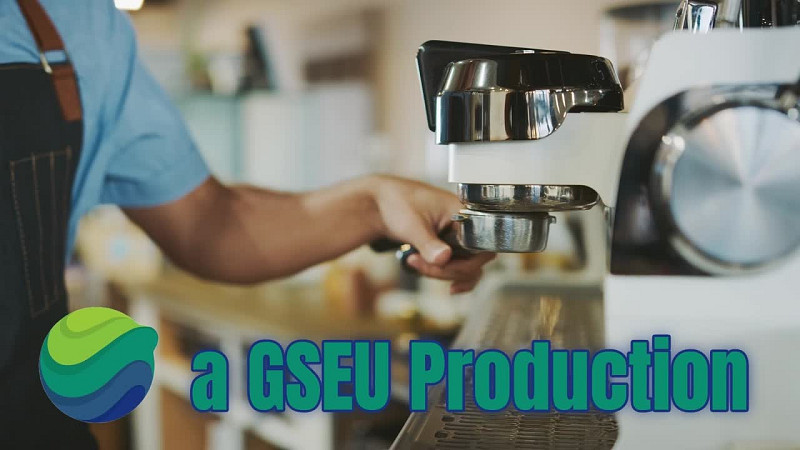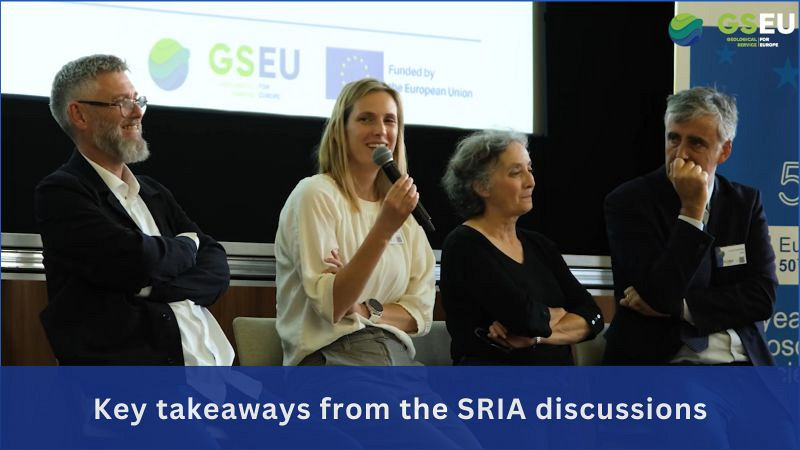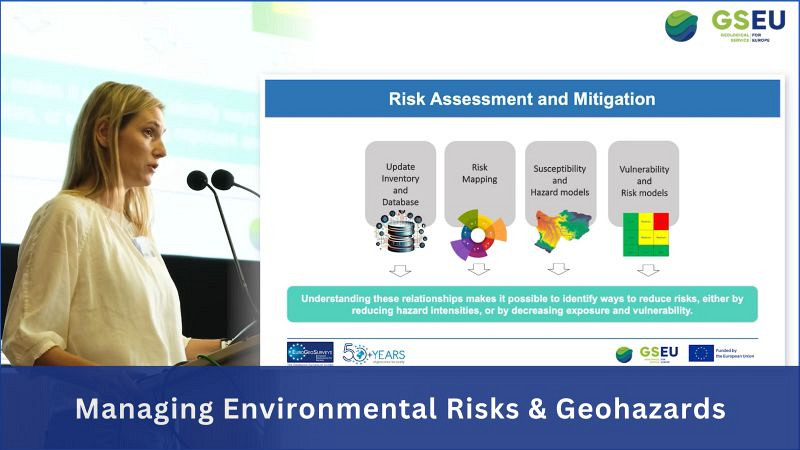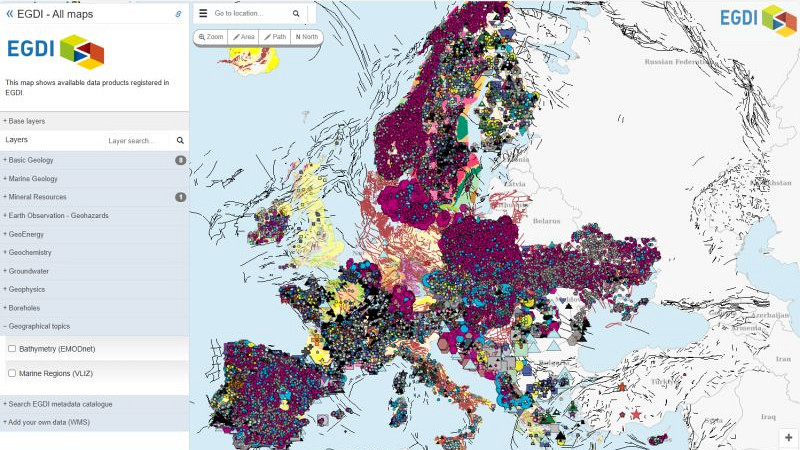GSEU Day took place in Brussels on 19 October 2023. Its purpose was to engage with our valued external stakeholders following a year of project implementation, and to drive forward our mission: a sustainable Geological Service for Europe. More than 100 people from all over Europe gathered to hear great presentations and discussions on all GSEU's areas of expertise: Raw Materials, GeoEnergy Resources, Groundwater Resources, Coastal Vulnerability & Windfarms and Geological Framework Setup, all connected and accessible through the European Geological Data Infrastructure.
Programme
Summary of the Panel Discussion:
- A critical mass of users (researchers, students, policy makers/decision makers, commercial users) is vital for the sustainability of EGDI and the GSEU as a whole. (Helen Glaves, EGU)
- Instead of always thinking that experts and associations have to provide the data and invest in the infrastructure, we can work in partnership with users so that they can maintain it while we continue to provide expert support. We need to be able to drive the integration and harmonisation of data and enable the usability of data across borders. (Sallie Payne Snell, EuroGeographics)
- We must move to the level of usability of the data collected in numerous projects and make the expert knowledge available. Therefore, the Critical Raw Materials Act obliges EU member states to provide data on critical and strategic mineral resources and to implement national exploration programmes. It is crucial for policy makers to have access to information from all 27 EU countries. Information (data, maps, etc.) must be harmonised, usable and simplified for a specific group of users. (Gerardo Herrera, DG GROW)
- It is the responsibility of national geological survey organisations to provide high quality, trusted and up-to-date data into the system and to establish quality control procedures. (Jasna Šinigoj, GeoZS)
- Establishing a legal framework for data sharing is almost mandatory, otherwise private sector data providers will claim ownership of their data. (Paul D. Allan, Quorum)Summary of the Panel Discussion:
- Geological expertise is invaluable in the construction of offshore wind farms, but existing marine geology data is not recognised and hardly used in practise, therefore access to data needs to be advertised in the offshore windfarm development community. (David Garcia Moreno, DEME)
- The geologists need to communicate what is important, what we are doing and what solutions we can bring to the society. (Niki Evelpidou, UOA)
- EMODNet sea-floor data are used in planning, but their resolution should be improved. (Gilles Lericolais, EMB)
- It is the duty of geologists to alert policy makers that in the urban development geological expertise is vital to avoid damage caused by geohazards. (Eleftheria Poyiadji, HSGME)
- Policy makers don’t care about data, they care about results (benefits vs. costs). In the marine science community, a more integrated approach is required to find the best solutions. The narrative towards policymakers has to be adapted to their specific needs and explain how they are going to benefit. (Zoi Konstantinou, DG MARE)Summary of the Panel Discussion:
- The regulatory framework is crucial to embed geological information needed to assess and deploy GeoEnergy technologies. In addition to increasing the level of technological readiness, we need to ensure that societal readiness is also developed. In this process, it is necessary to talk to stakeholders about subsurface hazards, e.g., seismic problems and the impact on drinking water. (Serge van Gessel, TNO)
- The EU Net-zero Industry Act, soon to be enforced, will be a major step towards implementing CO2 storage. Geoscientists are able to explain technologies and potential impacts to the public, who listen to us because we have no commercial interest in projects. (Paula Canteli, IGME)
- In the field of geothermal energy, we need to work on transversal topics such as extraction of raw materials from geothermal brines, heat storage and carbon capture and storage. The geothermal community needs to find a better way to communicate the use of geothermal energy to both policy makers and the public. (Isabella Nardini, Frauhofen IEG)Summary of the Panel Discussion:
- EGS and Member States are encouraged to cooperate with DG GROW to provide data to fill the gaps and avoid duplication. The CRM Act places a strong emphasis on sustainability, environmental and social acceptance of mining and related industrial activities. Only projects that meet the specified requirements and offer beneficial arrangements will be labelled as strategic projects. We hope that the geological community will resume exploration activities in European countries, but we need to convince society that we can do this in a green, sustainable way. (Robert Tomas, DG GROW)
- With the CRM Act and other regulations on batteries and semiconductors, the EU wants to secure the entire value chain and not just certain parts of it. (David Pennington, JRC)
- The geological community can support the implementation of the CRM Act, but we can only really support the first part of it – exploration; there is much more to do on the policy and planning side. (Koen Verbruggen, GSI)
- The knowledge, tools and means to accelerate critical mineral production in Europe are in place, but the efficiency of processes needs to be significantly improved. In Canada they managed to reduce the timeline by 40%, just by communicating and working together to remove the obstacles in the processes. (Ellie Gomes-Callus, BloombergNEF)Summary of the Panel Discussion:
- Based on available data on water quantity and quality, we can identify trends and even make predictions and forecasts, which is why we need to involve stakeholders and inform them that this information will be available. (Peter van der Keur, GEUS),
- EGDI will become an even stronger tool to provide access to information on groundwater for different stakeholders. (Klaus Hinsby, GEUS)
- We need to simplify communication with stakeholders, we should not trivialise the complex issues, but provide useful solutions. (Marco Petitta, Sapienza)
- Groundwater is highly susceptible to the effects of various surface and subsurface activities and can therefore be used as an example for planning subsurface use. (Kris Piessens, GSB-RBINS)
- We will support research on extreme drought and extreme flooding prevention, but we must also address the response to such water crises. (Philippe Quevauviller, EC EUROPA)Watch the recordings of all GSEU Day sessions
Speakers
Julie Hollis is Secretary General of EuroGeoSurveys, a not-for-profit association representing 37 Geological Surveys of Europe. EuroGeoSurveys bridges the geoscience–policy gap at European level, delivering expert scientific data and advice to support the green transition, and building strategic partnerships within Europe and with international partners, particularly in Africa and Latin America. Julie has a PhD in Geology and a Master of Science Communication and Public Engagement from the University of Edinburgh, and more than 20-years of experience in research and senior management roles in geological survey organisations and related ministries in Australia, Denmark, and Greenland.
Francesco Pizzocolo holds a MSc in Structural Engineering from Brescia University (IT). After graduating, he worked for 5 years as a fracture mechanics expert at the Eindhoven Technology University (NL). In 2013 he started his career at TNO as Geomechanics Scientists working on research and consultancy projects on various applications (induced seismicity, CCUS, geothermal energy, UGS, …). In 2018 he became group leader of the Materials for GeoEnergy group, supporting chemists and physicists in the development of materials used in the subsurface applications. Since September 2022 he coordinates, together with the EGS team, the GSEU project with the aim of establishing a Geological Service for Europe in 2027.
Guillaume Bertrand holds a Ph.D. in tectonics and geodynamics (1999) from the University of Paris. After two post-doc positions (USA and Germany), he started working at BRGM, the French Geological Survey, in 2003. He now works at BRGM Georesources Division as project manager and research engineer on primary mineral resources, the link between geodynamic contexts and mineralization genetic processes, mineral deposits databases and prospectivity mapping, in research projects co-funded by European and French public institutions. Since 2021 he’s head of the 'Geology of Mineral resources' (GEM) unit at BRGM, dedicated to primary mineral resources. He’s also expert for EuroGeoSurveys' Mineral Resources Expert Group and coordinator of the mineral resources work package in GSEU.
Paula Canteli, PhD is Mining Engineer at the Geological Survey of Spain since 2000, with an intermediate of 10 years working internationally in energy resources (Europe and Asia). Since her return to IGME in 2016, she has been working in geological storage (CO2, H2), being responsible for national and European projects of Horizon Europe (and Horizon 2020). Coordinator of geological storage at the National Geological Survey. Leader/co-leader of the geological storage group in various national and international organizations (PTECO2; European Geological Survey (EuroGeoSurvey)) and member of the Executive Committee of the European Network of Excellence in CO2 Geological Storage (CO2GeoNet).
Peter van der Keur, PhD is Senior Researcher at the Geological Survey of Denmark and Greenland (GEUS) and has a background as hydrologist with long time experience in hydrological assessment studies and climate change and adaptation and disaster reduction studies. In recent years he has been involved in hydrologic impact studies related to extreme weather events and climate change adaptation, especially using nature-based solutions. Recently he has coordinated the GeoERA TACTIC project on climate change impact on groundwater resources and is currently coordinating the part on groundwater resources in the Geological Service for Europe project. He is chair of the UNECE Groundwater Resources Working Group contributing to the UN Framework Classification for Resources (UNFC) and UN Resources Management System (UNRMS) to manage the natural resources required for the present and future needs of the society and realizing the objectives on Sustainable Development Goals (SDGs).
Sytze van Heteren (PhD in Geology, Boston University, USA) has been a coastal and marine geologist at TNO - Geological Survey of the Netherlands since 1999. During this time, he has conducted and managed many of the Survey’s coastal and marine research and mapping activities in and along the Dutch North Sea. His involvement in European endeavours started in 2004 when he joined the interdisciplinary project MESH (Mapping European Seabed Habitats) under FP6. He has been a work-package leader in EMODnet Geology from its inception in 2009, coordinating the harmonization of data and information on coastal behaviour, and is the current Chair of EuroGeoSurveys’ Marine Geology Expert Group.
Kris Piessens is a senior geologist with 20 years of post-doc experience, after specialising as Master in structural geology and obtaining a PhD in mineralogy and geochemistry. He is well known for working in multi-disciplinary research projects, such as on low-carbon technologies, geological economics, subsurface management and geological models. He is geologist at the Geological Survey of Belgium, section of the Royal Belgian Institute of Natural Sciences.
Watch his talk here or download the presentation
Matt Harrison is the director for Digital Platforms at the French Geological Survey, BRGM, based in Orléans France. From this and his previous position as Director of Informatics at the British Geological Survey, Matt brings a depth of experience in the application of geoscientific data to subsurface challenges, leading in developing new approaches in Europe and in collaboration across the world. With more than 20 years of professional experience, Matt has worked as a digital specialist and geoscientist across the marine and coastal, natural hazard, energy and mineral extraction domains, on projects and initiatives for Governments, academia and industry. He has set up numerous collaborative initiatives including the Natural Hazards Partnership in the UK, and contributed to the creation of the EPOS Research Infrastructure in Europe and OneGeology, globally.
Sallie Payne Snell is Acting Secretary General and Executive Director of EuroGeographics. A highly respected senior manager, she has an international network of geospatial contacts gained through extensive relationship and reputation management experience. Sallie represents EuroGeographics in its capacity as Observer Organisation at both the United Nations Committee of Experts on Global Geospatial Information Management (UN-GGIM) and UN-GGIM: Europe. Her previous positions include Deputy Director at the Association for Geographic Information and International Stakeholder Relationship Manager at Ordnance Survey Great Britian. She holds a BSc in Geographical Science.
Creating a successful spatial data platform: Open Maps for Europe (.pdf)
Paul D. Allan as Vice President Consulting at Quorum Software, he works with international E&P clients in support of strategic planning, capital allocation, risk assessment, and decision making under uncertainty. His consulting work involves assessing company portfolios and advising executives on strategy, risk mitigation, and the evaluation of major projects and options. Over the past several years Paul has been active in developing portfolio analysis and modelling techniques focused on energy transition, supporting companies as they shift their business models towards lower carbon options. This has included economic modelling of clean energy investments, emissions forecasting, and scenario analysis as companies evolve their strategic plans.
Tracey Dancy represents EGS as Communication, Dissemination and Exploitation Manager for GSEU. Tracey is CEO of Dancy Energy Consulting, a niche communications company specialising in working with Energy and Subsurface clients. She holds a first-class honours degree in English and Humanities, and is skilled in writing, communicating, networking and leadership. She enjoys working on projects that bring together diverse disciplines and industries, creating networks and finding areas of mutual interest. Tracey’s clients include several non-profits, as well as technology companies with a focus on data management.
Nils A. Røkke is the Executive Vice President Sustainability in SINTEF, the largest research institute in Norway with 2200 employees. President of EERA- the European Energy Research Alliance. PhD in combustion from NTH (NTNU). Gas Turbine Design and Development Manager in Rolls Royce Marine before returning to SINTEF in 2002 as Vice President Gas Technologies and Director of the Gas Technology Centre NTNU-SINTEF. Vice-chair research in ZEP (zero emission power). Member of the Portfolio Board (Energy, Low Emissions and Transport) of the Norwegian Research Council (RCN). Contributor in Forbes writing on energy and climate issues and also actively taking part in the public debate on the energy and climate transition. Founder of the TCCS conference series. Director of the HYDROGENi FME Centre focusing the value chain of hydrogen and ammonia.
Ralph Watzel is a German hydro-geologist and the President of the Federal Institute for Geosciences and Natural Resources (BGR), which is subordinated to the Federal Ministry for Economic Affairs and Climate Action. He was appointed President of the federal geological survey of Germany in 2016. He had been elected to a two year term (2021-22) as President of EuroGeoSurveys. After more than 10 years of practical international experience as hydrogeologist, he worked as consultant for sustainable development at Ministry of Economy of Baden-Württemberg from 2001 to 2006. From 2006 to 2016 he served the head of the regional geological survey and mining authority of Baden-Württemberg. He is a graduate of the Technical University Karlsruhe and postgraduate of Freiburg University, where he is engaged in academic teaching since 2000. In 2007 he completed a management education at St. Gallen university, Switzerland.
Watch his talk here or download the presentation
Martin Peersmann is Programme Manager for the Keyregistry of the Subsurface at the Ministry of the Interior and Kingdom Relations (BZK), seconded by the Cadastre of the Netherlands. From 2008 to 2015 he was Director-Secretary for the Large-scale Basemap of the Netherlands (GBKN) at the Cadastre of the Netherlands, leading a public-private partnership. His career started in geological research at TNO-NITG Geological Survey of the Netherlands from 1996 to 2008, and he also contributed his expertise to Shell E&P International from 1989 to 1996. He received his PhD in geology, specialising in sedimentology, from the University of Utrecht, Faculty of Earth Science.
Watch his talk here or download the presentation
The importance of 3D /4D geomodelling for national policy making (.pdf)
Niki Evelpidou is a Professor at the Faculty of Geology and Geoenvironment of the National and Kapodistrian University of Athens (Greece) and collaborating Teaching Staff at the Hellenic Open University. During 2018-2020, she was Faculty Affiliate in the Department of Geology and Environmental Geosciences of the University of Charleston, America. She holds a PhD from the Faculty of Geology & Geoenvironment of the University of Athens on geomorphology and GIS techniques and a PhD from the Faculty of Geoarchaeology of the University of Franche Compte (France) on geoarchaeology and GIS techniques. The focus of her research is related to geomorphology, geoarchaeology, sea level changes, palaeogeography, geocultural heritage, Geographic Information Systems, the study and modeling on natural hazards and adaptation and mitigation strategies.
The future of the coastal zone – adaptation and mitigation strategies (.pdf)
David García Moreno has a PhD on earth sciences from University of Ghent and 16 years of professional experience in the public and private sectors. David has a multidisciplinary geological background, being the author or co-author of 14 papers in the fields of Quaternary geology, geomorphology, marine geology, marine geophysics, earthquake geology, seismic risks and hazards, and submerged archaeology. Currently, he works at the geological department of the DEME Group, where he carries out integrated soil models for offshore wind farms and provides geological support to the different activity lines of the group.
Isabella Nardini is a Manager of International Affairs at Fraunhofer IEG - Institution of Energy Infrastructures and Geothermal Systems. Graduated (BSc and MSc) in Geoscience and got the PhD in Geochemistry and Petrology of volcanic systems at University of Pisa. Expert in transfer and strategy development. Active leader of projects and programs to support development and internationalization in the renewable energy sector. Vice-Chair of the LEAP-RE, Long-Term Joint European Union - African Union Research and Innovation Partnership on Renewable Energy. Board Member of the European Geothermal Energy Council. Senior researcher, lecturer of Hydro- and Geochemistry at the Bochum University of Applied Science, Environmental Engineering (MSc).
Slavko Šolar holds a PhD as Mineral Resource Geologist who worked as an exploration geologist, head of department, consultant, policy adviser for the Slovenian government and industry on minerals, resource management and sustainability, besides he was coordinator of many projects and the Mining Public Service, all at the Geological Survey of Slovenia. For the last 10 years, before becoming Economic Affairs Officer at UNECE dealing with UNFC implementation in Europe in 2021, he was a Seconded National Expert to DG GROW, a Senior Scientific Officer at DG Joint Research Centre (JRC), and Secretary General of EuroGeoSurveys. He has an extensive list of publications related to his expertise published in journals and conference proceedings.
Ellie Gomes-Callus is a Metals and Mining Analyst at BloombergNEF. Her research covers battery metal markets, global critical mineral policies and the pathways to decarbonization for the mining sector. Prior to her role at BloombergNEF, Ellie spent her time as a Research Scientist with RFC Power, an energy storage start-up, before joining the UK Government. At the Department of Business, Energy and Industrial Strategy, she worked in oil and gas policy and energy innovation funding. Ellie holds a BSc in Natural Sciences from the University of Nottingham and a MRes in Green Chemistry from Imperial College London.
Watch her talk here or download the presentation
David Pennington is a project leader and member of several portfolio leadership teams in the European Commission’s Joint Research Centre (JRC). The JRC is a Directorate General of the European Commission that provides science-based, in-house support within the European Commission. David’s specialisation is on the secure and sustainable supply of raw materials, taking a full life cycle approach. He interacts with Commission colleagues in relation to the EC’s Raw Materials Information System (RMIS), supply risk, circularity, as well as life cycle assessment. He has 30 years of experience, a PhD from the Hong Kong University of Science and Technology and B.Eng from Surrey University in Chemical Engineering. David is based in Ispra, Italy, in JRC’s Sustainable Resources Directorate in its Land Resources and Supply Chain Assessments Unit.
Watch his talk here or download the presentation
Klaus Hinsby (GEUS)
Marco Petitta (Sapienza University of Rome)

